Response to 60 Day Comments
Appendix E - IPEDS 2022-23 through 2024-25 Response to 60-day Public Comments.docx
Integrated Postsecondary Education Data System (IPEDS) 2022-23 through 2024-25
Response to 60 Day Comments
OMB: 1850-0582
Integrated Postsecondary Education Data System (IPEDS) 2022-23 through 2024-25
Appendix E: Response to Public Comments Received During the 60-day Comment Period and NCES Responses
OMB No. 1850-0582 v.30
Submitted by:
National Center for Education Statistics (NCES)
Institute of Education Sciences
U.S. Department of Education
May 2022
Table of Contents
Comments related to proposed gender change 4
Comments related to the Student Financial Aid survey component 5
Comments related to the proposed race/ethnicity changes 6
Comments related to the collecting data on students with disabilities 7
Introduction
This attachment contains the responses to public comments on the annual mandatory collection of postsecondary data through IPEDS. The 60-day comment period for the IPEDS package closed on April 26, 2022. ED received a total of 64 comments (though one comment was duplicated) from 229 total signatories (some comments are signed by multiple signatories; those from the duplicate comment are not included in this count), many covering multiple topics.
Submitter category* |
Submissions |
Signatories** |
Total |
63 (does not include duplicate comment) |
229 (does not include signatories of duplicated comment) |
Institution of Higher Education; State Higher Education Office |
24 |
41 |
Association/Organization; Civil Rights; National or State Advocacy Organization; Community Organization |
15 |
150 |
Individual; Student; Teacher; Education consultant |
7 |
7 |
Federal agency |
2 |
15 |
Other; None selected |
15 |
16 |
* Categories are self-reported.
Comments related to proposed gender change
Public response
NCES received 42 comments with a total of 112 signatories related to the new gender collection and the Directed Question related to potential future collection of gender in IPEDS. Some comments were focused on gender whereas other comments included gender within a broader comment covering other areas of IPEDS.
All comments supported the addition of more detailed collection on gender beyond the binary men/women categories.
Recommendations/Concerns
Most of the comments also suggested that NCES change the terminology to remove the term ‘other’.
Two of the comments mentioned that their institutions do not currently collect data on nonbinary genders, and they would not be able to report in 2022-23.
Some comments encouraged NCES to add the new gender options throughout the IPEDS survey components.
One comment suggested that NCES should mandate the collection of these data as well as the format of the question, much like was done in the past for revisions to race/ethnicity data collection. The concern was that if NCES does not mandate that institutions ask a question that includes non-binary genders many institutions will continue current practice of collecting binary genders and data users will not be able to interpret the meaning of low numbers of non-binary individuals (e.g., does zero mean no non-binary individuals or does zero mean the institution did not collect the data?).
ED response
In selecting the term ‘Gender other’ to operationalize the genders that do not fit the binary men and women categories, the intention was not to stigmatize or other students with diverse gender experiences, but to ensure that we did not use a term that could potentially exclude gender experiences. We also chose a term that would allow institutions flexibility in their collection of data on diverse gender experiences. Because the collection of gender is not currently directed by OMB and the Department in the same way as race/ethnicity data are directed, NCES cannot mandate that institution’s collect gender data in a particular way.
NCES acknowledges that ‘Gender other’ may be stigmatizing and changes to the proposed collection have been made to use ‘Another gender’ in place of ‘Gender Other’. In addition, NCES is proposing an addition that will allow institutions time to implement necessary changes and to clarify what data re reported. Please see the revised documents, including Part A, Appendix A, Appendix D, and the survey packages for 12-Month Enrollment, Fall Enrollment, Completions, and Graduation Rates.
NCES will continue to explore ways to better collect data on gender in IPEDS. As an administrative data collection that collects from the institution and not the individual, IPEDS must carefully consider institutional burden and potential privacy concerns.
Associated comments
08; 10; 11; 12; 13; 14; 15; 16; 17; 18; 19; 20; 21; 22; 23; 24; 25; 26; 27; 28; 29; 30; 31; 32; 34; 35; 38; 39; 40; 41; 42; 43; 45; 47; 48; 51; 52; 53; 55; 59; 62; 63
Comments related to the Student Financial Aid survey component
Public response
NCES received 5 comments with 5 signatories related to the Student Financial Aid (SFA) survey component.
Two comments expressed support for the proposed collection of financial aid data on non-degree-seeking learners that would provide improved insights into how learners are leveraging postsecondary education systems and financing options to meet their unique needs. No comments opposed the addition.
Recommendations/Concerns
One comment requested that IPEDS consider changing largest program to largest Title IV program for program reporters.
One comment recommended that SFA data be disaggregated by race/ethnicity and gender identity.
One comment recommended that NCES consider modifying Group 1 to first-bachelor or lower degree seeking students.
Two comments recommended that NCES include information about parent and private student loans and average cumulative loan burdens for graduating students at differ degree levels.
One comment recommended that NCES allow institutions to report room and board costs for students living at home more accurately.
ED response
NCES appreciates the support of the upcoming changes to the SFA survey component. NCES is considering numerous other changes to the SFA survey component that will be proposed in a separate clearance. Those changes will likely include the change to the largest program to be the largest Title IV program as well as more consistent data for the student types. However, currently NCES does not plan to collect data by r/e and gender identity, due to concerns about institutional burden and student privacy. Nor will IPEDS collect data by first-bachelor or lower. As second-bachelor students are included in the ‘all undergraduates’ category, the Pell percentage at the institution should already include second-bachelor’s students.
The SFA survey component currently collects data on other loans (including private loans) to students but not loans to parents. The recommendations of the Technical Review Panel (TRP) on Improving the Student Financial Aid component did not support collecting data on parent loans. In addition, Parent PLUS loan data are currently available through the College Scorecard.
While the TRP agreed that data on cumulative debt are important, it did not support the addition of cumulative debt to IPEDS. Cumulative debt information is available in the College Scorecard and collected by the Office of Federal Student Aid (FSA), and FSA has developed tools to help students track their cumulative debt throughout their time in postsecondary education. While there are some limitations to each of these options, addition of cumulative debt to the IPEDS collection at this time would lead to duplicative federal reporting. Panelists at the TRP were particularly concerned about the burden on small institutions if cumulative debt were to be added to the IPEDS collection. While many institutions may report this information to the Common Data Set (CDS), CDS reporting is not federally mandated and there are many institutions that report to IPEDS that do not report the CDS. The proposed additions, while important, would present additional burden on institutions that is not currently supported by NCES’s discussions with stakeholders. NCES will continue to work with FSA to determine whether there are ways that we can work together to improve the data on topics such as cumulative loan debt.
Finally, NCES and the National Postsecondary Education Cooperative (NPEC) are commissioning a paper to look at the potential to create a student pricing survey that could better collect data on issues such as room and board costs, along with other issues related to pricing. That work should start soon, but any recommendations from the paper or a subsequent TRP would be included in proposals for future data collections.
Associated comments
ED-2022-SCC-0026-00:
04; 05; 07; 40; 59
Comments related to the proposed race/ethnicity changes
Public response
NCES received 9 comments with 64 signatories on the proposed expansion of the guidance on DACA and undocumented students, the nonresident terminology, and the Directed Question on citizenship and race/ethnicity.
Most comments supported the removal of the ‘alien’ terminology. While commenters expressed support for guidance on reporting DACA and undocumented students, they did not support the extension of the existing guidance related to DACA and undocumented students.
Recommendations/Concerns
One comment suggested NCES add ‘U.S’ before nonresident to clarify that the question is not about students at state collected that are not from the state.
Multiple comments suggested that NCES include DACA and undocumented students throughout the race/ethnicity categories, as this ensures that institutions do not have to identify these students (which could create risk for students) and that r/e for these students in key in understanding institutional demographics.
Multiple comments recommended that NCES should define resident students (the group for which race and ethnicity are reported) as those who completed high school or a GED equivalency within the U.S. and were not on an F-1 visa at the time of high school graduation.
Responses to directed questions recommended that NCES carefully consider any changes to future changes related to citizenship and race/ethnicity.
ED response
Based on the comments received, NCES will make several changes to the proposal for collecting data on race/ethnicity.
First, NCES will remove the ‘alien’ terminology but add ‘U.S’ nonresident on collection pages to ensure that institutions understand that ‘nonresident’ is not related to state residency.
Second, NCES will amend the guidance on how to report DACA and undocumented students through the IPEDS survey components in the instructions and FAQs related to race/ethnicity reporting. Please see the revised documents, including Appendix A, Appendix D, and the survey packages for 12-Month Enrollment, Fall Enrollment, Completions, and Graduation Rates.
Finally, NCES and the National Postsecondary Education Cooperative (NPEC) will continue to examine this important topic and carefully consider any future changes to this guidance.
Associated comments
ED-2022-SCC-0026-00:
43; 46; 49; 50; 55; 56; 59; 60; 62
Comments related to the collection of data on students with disabilities
Public response
NCES received 6 comments with 31 signatories on the collection of data on students with disabilities.
The comments suggested multiple additions to IPEDS related to students with disabilities.
Recommendations/Concerns
All comments recommended that disabilities be added as a core demographic element across all surveys and for all undergraduates, graduate students, faculty, and staff.
Two comments recommended partnering with the disability community to develop strategies for developing questions and collecting and utilizing data.
Two comments recommended that NCES encourage institutions to publish information explaining their documentation requirements for students with disabilities to secure accommodations on their college campus.
One comment recommended IPEDS include data on comprehensive transition and postsecondary (CTP) in IPEDS
ED response
As noted by the commenters, IPEDS currently collects only the percentage of undergraduate students enrolled during a fall term who are formally registered as students with disabilities with the institution’s office of disability services (or the equivalent office). In addition, NCES collects (on the institutional identification page) and makes available to public via the College Navigator website a link to the institution’s website that is mandated to provide information on student activities, services offered for individuals with disabilities, career and placement services, and policies related to the transfer of credit from other institutions. These collections are required by the Higher Education Opportunity Act of 2008 (P.L. 110-315). Finally, NCES allows institutions to provide more information about their disabilities services in a context box tied to the question on the percentage of students enrolled.
Collecting data beyond what is required in the statute is valuable and, as outlined, necessary to identify and address inequities at higher education institutions and help to meet the needs of all students and staff. However, it is vital to ensure that the data collected adhere to data privacy laws and regulations. Some institutions may have a small number of students or staff with disabilities resulting in small cell sizes, and thus, data privacy issues may occur.
NCES is also committed to making sure that the data collected are accurate and, at the same time, not overly burdensome for institutional data reporters. Some institutions with limited staff and IT capacity may not be able to collect and report accurate data without the official records or students reporting the disability. Also, students with disabilities may not always feel comfortable with disclosing this information to their institutions.
NCES does collect valid national estimates of postsecondary students with disabilities through its sample survey program. For example, the National Postsecondary Student Aid Study (NPSAS) asks whether students have a disability. While not institution level data, these national estimates provide valuable information on students with disabilities.
NCES has added a checkbox item for institutions where they can indicate if they have ‘Comprehensive transition and postsecondary program for students with intellectual disabilities’ in the Institutional Characteristics survey component. As NCES examines the potential to add more information about students with disabilities to future collections, it will partner with the disability community as well as the institutions that provide data to IPEDS. NCES holds Technical Review Panels to discuss potential changes and determine whether institutions can report additional data items and the associated burden, as well as potential privacy concerns.
Associated comments
ED-2022-SCC-0026-00:
09; 37; 40; 59; 65; 66
Comments related to the proposed collection of data on noncredit enrollment
Public response
NCES received 11 comments with a total of 26 signatories related to the proposed changes to the IC Header and E12 survey components to collect information related noncredit education offerings and enrollment, respectively, and the Directed Question related to the potential future collection of disaggregated noncredit enrollment counts by race/ethnicity and gender.
Most comments were in support of including noncredit offerings and enrollment in IPEDS, as IPEDS currently does not collect any information on this topic. A few comments were concerned about the burden imposed on institutions by having to report noncredit enrollment counts.
Recommendations/Concerns
Two commenters suggested that the definition of noncredit education should be revised to clarify if certain activities would be included under the definition and therefore reported (e.g., employee professional development, summer camps, cooperative extension).
Three commenters suggested revising the currently proposed “Continuing Education/Professional Education” option on IC Header Question 5 to avoid confusion and overlap with noncredit terminology.
Three commenters pointed out that the “Developmental Education” (which is an option on IC Header proposed Question #5) may also be offered for credit and perhaps should not be removed from the current IC-H Question #1 (educational offerings).
One commenter pointed out the inconsistent use of the terms “Developmental Education” and “Remedial Education” throughout the E12 survey materials.
Four commenters suggest the expansion of noncredit topics into other IPEDS survey components, including Completions, Human Resources, Outcome Measures, and Student Financial Aid.
Two commenters strongly recommended the inclusion of noncredit enrollment counts disaggregated by race/ethnicity, whereas two other commenters suggested that including such data would not be possible with current data systems and would be duplicative with HEERF reporting.
One commenter suggested the additional disaggregation of noncredit enrollment by age categories.
Two commenters suggested that producing an “unduplicated” headcount for noncredit enrollment would require substantial effort.
Three commenters suggested that collecting noncredit enrollment counts would impose substantial burden on institutions (e.g., integrating disparate data systems), particularly for four-year state systems and smaller independent colleges.
ED response
Building upon the currently proposed FAQ #1 and FAQ #2 for Part D Noncredit education, NCES will provide additional examples of what to include and exclude from noncredit education reporting in the survey component instructions.
For the currently proposed Question #5 on the IC Header survey component, NCES will change the “Continuing Education/Professional Education” to “Continuing Professional Education” alone, so as not to conflate “Continuing Education” terminology with noncredit education terminology. The term “Continuing Professional Education” already exists in the IPEDS Glossary, defined as “Programs and courses designed specifically for individuals who have completed a degree in a professional field (such as law, medicine, dentistry, education, or social work) to obtain additional training in their particular field of study.”
NCES will remove “developmental education” terminology and adopt the “remedial education” terminology as a noncredit education offering on the proposed Question #5 on the IC Header survey component. NCES proposed a refined definition for “remedial education” beginning in the 2022–23 collection year, which reads: as “Remedial education: Courses or programs designed to develop the reading, writing, and/or math skills of students who are determined–typically by a standardized test–to be academically underprepared for college-level, credit-bearing courses.” In addition, NCES will add “remedial education” back to Question #1 on IC Header and clarify that these educational offerings reflect for-credit options, as remedial education may be offered both for-credit and not-for-credit.
While NCES understands the higher education community’s interest in how noncredit education is staffed and financed as well as the educational and workforce outcomes of student enrolled in noncredit education, at this time there are no immediate plans to expand data collection beyond IC Header and E12 survey components.
NCES will also examine the feedback from the Directed Question related to HEERF reporting requirements to understand the feasibility of collecting noncredit enrollments by race/ethnicity and gender, however, there is no immediate plan to add race/ethnicity and gender breakdowns. These and other student subgroups may be explored for future collection.
Institutions are encouraged to report unduplicated headcount enrollment, which is consistent with how for-credit enrollment is currently reported. However, if institutions are not able to report unduplicated headcount noncredit enrollment, they should report duplicated headcount enrollment and indicate that this value is duplicated (i.e., not mutually exclusive and students may be “double counted” across noncredit education participation). NCES will add a radio button option for data reporters to indicate if they are reporting duplicated or unduplicated headcount enrollment in Part D.
NCES recognizes the upfront work required to prepare data systems to report new information to IPEDS. At this time, IPEDS intends to implement Part D – Noncredit education in the E12 survey component for the 2023–24 collection year for all institutions that offer noncredit education, as indicated on the IC Header survey component. This first data collection will inform next steps on future data collection activity related to noncredit education.
Associated comments
ED-2022-SCC-0026-00:
08; 33; 43; 53; 55; 57; 59; 61; 62; 64; 67
Comments related to the Admissions survey component
Public response
NCES received 3 comments with 17 signatories on the proposed changes to the Admissions survey component and the associated Directed Question.
Recommendations/Concerns
Comments supported the additions proposed to Admissions, including the additional admissions considerations and median percentile.
There was mixed support for the 10th and 90th percentiles, with some comments supporting the change and others indicating they were not useful due to changes in test requirements at institutions.
There were some suggestion that NCES should also consider additional questions about institutional admissions practices, including questions on institutional recruitment practices, whether or not institutions consider first-generation status in their admission processes, whether or not institutions use demonstrated interest in their admissions decisions, whether and how they use information on criminal justice involvement, and whether they offer early decision or early action admission deadlines for applicants.
ED response
NCES will move forward with all changes proposed during the 60-day comment period based on feedback from commenters, however, NCES will not add the 10th and 90th percentiles at this time based on the comments received.
NCES will also continue to consider changes to the Admissions component for future collections, including the suggestions made in the comments.
Associated comments
ED-2022-SCC-0026-00:
43; 44; 59
Comments related to the collection of data on student health services
Public response
NCES received 1 comment with 1 signatory on the proposed changes to the Admissions survey component and the associated Directed Question.
Recommendations/Concerns
Recommended the addition of the following questions to the IPEDS data collection:
Does your institution provide students with access to health care, including through contractual arrangements with off-campus and/or external providers?
Does your institution have a student health services center on campus?
Does your institution provide students with access to mental health counseling, including contractual arrangements with off-campus and/or external providers?
Does your institution offer mental health counseling services on campus?
Does your institution offer health/well-being prevention education?
ED response
NCES does not have plans to add questions about health care to IPEDS at this time, however, NCES will work with the National Postsecondary Education Cooperative (NPEC) to discuss whether this collection should be added to the IPEDS. If recommended by NPEC, NCES would then likely hold a Technical Review Panel (TRP) to ensure that the questions are appropriate to IPEDS and that institutions are able to respond to the questions without excessive burden.
Associated comment
ED-2022-SCC-0026-0036
Comments related to proposed addition of dual enrolled student collection
Public response
NCES received 3 comments with a total of 49 signatories related to the new collection of dual enrolled students in the 12 Month Enrollment survey component.
Recommendations/Concerns
All 3 comments and 49 signatories supported the addition of dual enrolled students to 12 Month Enrollment by race/ethnicity and gender.
One comment with 1 signatory recommended NCES further consider the placement of dual enrolled students in non-degree/certificate-seeking.
ED response
NCES is happy to receive favorable feedback on the addition of dual enrolled students by race/ethnicity and gender. NCES believes that this information will be vital in better understanding postsecondary opportunities. While NCES does not plan to change the inclusion of dual enrolled students in the non-degree/certificate-seeking category at this time, NCES will continue to examine this issue and use the data that will be collected to further improve collection of data on dual enrolled students.
Associated comments
ED-2022-SCC-0026-00:
40; 54; 62
Comments related to student success measures
Public response
NCES received 3 comments with a total of 18 signatories related to IPEDS measures of student success.
Recommendations/Concerns
I request that the Graduation Rates and Graduation Rates 200 surveys be modified to allow institutions that offer multiple degree levels to report on multiple timeframes for 100%, 150%, and 200% of normal time to completion.
Two comments with 17 signatories recommended NCES expand Outcome Measures to non-degree-granting institutions.
One comment with 15 signatories recommended NCES disaggregate Outcome Measures by race/ethnicity and gender.
One comment with 15 signatories recommended NCES streamline GR and GR200 along with OM
ED response
NCES does not have any plans to change student success measures in the current clearance. For expanding OM to non-degree-granting institutions, NCES would need to carefully consider the additional burden on these institutions that are often less resourced.
NCES is currently working with the National Postsecondary Education Cooperative (NPEC) to see if there are ways to improve the collection of data on student success.
Associated comments
ED-2022-SCC-0026-00:
06; 40; 59
Comments (in numerical order)
Docket: ED-2022-SCC-0026
Integrated
Postsecondary Education Data System (IPEDS) 2022-23 through 2024-25
Comments
On: ED-2022-SCC-0026-0001
Agency
Information Collection Activities; Comment Request; Integrated
Postsecondary Education Data System (IPEDS) 2022-23 Through 2024-25
Comments are listed in order by comment number.
Document: ED-2022-SCC-0026-0004
Received: February 25, 2022
Posted: February 25, 2022
Category: Institution of Higher Education
Submitter Information
Organization: Apollo Career Center
General Comment
Request for Special Consideration of IPEDS definition of Full-Time at a Clock Hour Postsecondary School and the ways the current definition skews data:
I am a Financial Aid Specialist at a Clock Hour School, and wanted to bring to your attention the issues that the IPEDS definition of “Full-Time” causes many Career Centers that operate on Clock Hours.
IPEDS defines Full-Time as 24 hours/week (but does not give any consideration to how many weeks a program lasts, nor does it give any consideration to whether a program is Title IV eligible or not). What this means is that our State Tested Nurse Aid program (which is only 3 weeks long for a total of 76 Clock Hours) is our LARGEST Full-Time program. The reason for this being the largest is because we can filter through many more students in a 3-week program throughout the year versus our Title IV programs that last an average of 11 months.
I am requesting that IPEDS gives consideration to updating your rules for Clock Hour programs to incorporate a minimum number of weeks that a program must last in order to be considered Full-time.
Due to having to report a 76 Clock Hour program that only costs $700 in total as our largest program, this absolutely skews the data that is then reported on the College Navigator, the Net Price Calculator, and now also incorporated into the Loan Entrance Counseling. I have to say that a program that is NOT eligible for Pell or Loans and only costs $700 being shown within the Loan Entrance Counseling session (which is required for all students that are borrowing Title IV loans) is very frustrating to me. This low cost 3-week program is NOT representative of our programs that can receive Financial Aid. Our Title IV Loan eligible programs average around $9,000 for Tuition & Fees….but attached is a snapshot of what a student completing Entrance Counseling at our school will see:
Loan
Entrance Counseling COA - skewed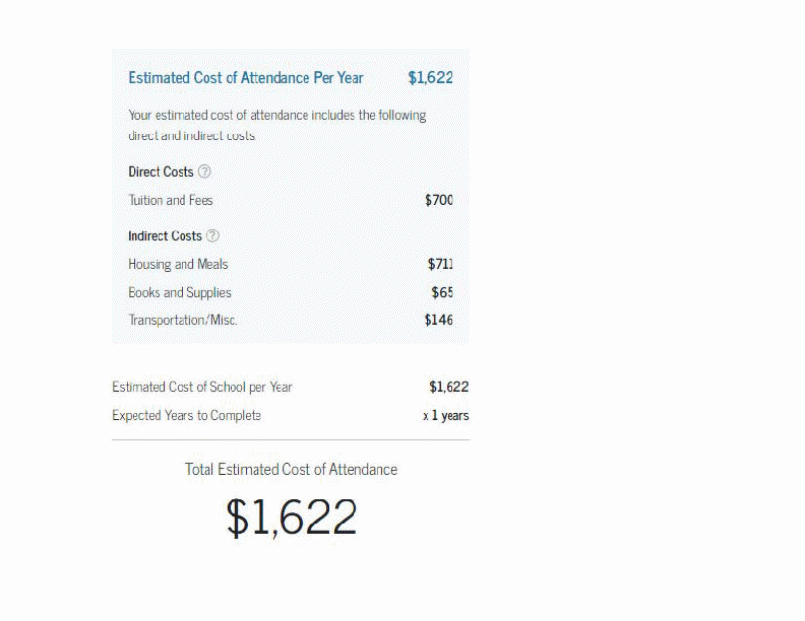
Document: ED-2022-SCC-0026-0005
Received: March 01, 2022
Posted: March 02, 2022
Category: Private/Non-Profit Institution of Higher Education
Submitter Information
Name: Brooke Kile
General Comment
SFA Survey - The proposed changes reflect the addition of "degree/certificate-seeking (DCS) and non-degree/non-certificate seeking (NDNCS) students" as a way to "simplify the calculation and provide a better [Pell grant recipient] percentage on College Navigator". Our institution has a very large population of second-bachelor degree students which is not accounted for in the SFA survey and results in a much lower percentage of Pell grant recipients at the overall undergraduate level than what is experienced by our first bachelor degree seeking students.
I encourage NCES to consider modifying Group 1, instead of those who are degree seeking or non degree seeking, as first-bachelor or lower degree seeking students.
Document: ED-2022-SCC-0026-0006
Received: March 02, 2022
Posted: March 03, 2022
Category: Institution of Higher Education
Submitter Information
Name: Lisa Smith
General Comment
I would like to request a new change for future IPEDS Graduation Rates and Graduation Rates 200. My institution is a community college that historically offered associate degrees as the highest level of completion; this year, we have been approved to offer two bachelor of applied science programs. Associate degree completers are still our largest population of graduates. Now that our highest level of degree awarded is the bachelor's, our IPEDS Graduation Rates 150% of normal time to completion timeframe has been extended from 3 years to 6 years. We have heavily used the completion rate for 150% (3 years) time to completion in state and internal reporting for years, and it is a valuable rate for us and our fellow state community colleges. With this extended timeframe on which we must report, the cohort on which we are reporting is too old to be meaningful for decision-making. Other community colleges in my state have expressed this same difficulty. I request that the Graduation Rates and Graduation Rates 200 surveys be modified to allow institutions that offer multiple degree levels to report on multiple timeframes for 100%, 150%, and 200% of normal time to completion.
Document: ED-2022-SCC-0026-0007
Received:
March 05, 2022
Posted: March 07, 2022
Category: Other
Submitter Information
Name: Mark Kantrowitz
General Comment
IPEDS does not currently include information about parent loans and private student loans. But, without this data, various U.S. Department of Education tools, such as College Navigator and College Scorecard, provide consumers with an incomplete picture of college affordability. IPEDS also does not provide information about average debt at graduation including these loans. The median debt figures are just for federal student loans, not parent or private loans. Also, the use of median figures does not provide a complete picture of the distribution of debt at graduation (10th, 25th, 50th, 75th and 90th percentiles would be help, as would the mean). Colleges have demonstrated an ability to collect this information, as it is included in the Common Data Set (CDS). Therefore, the U.S. Department of Education should consider adding information about private and parent loans to IPEDS.
Document: ED-2022-SCC-0026-0008
Received: March 13, 2022
Posted: March 14, 2022
Category:
Other
Comment
on FR Doc # 2022-04043
Submitter Information
Name: Eric Atchison
General Comment
See attached file.
Attachments
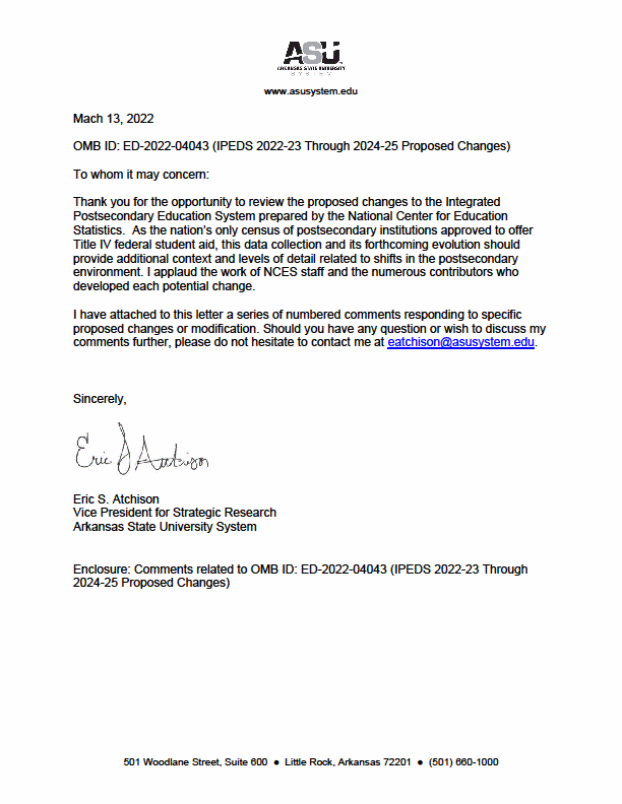
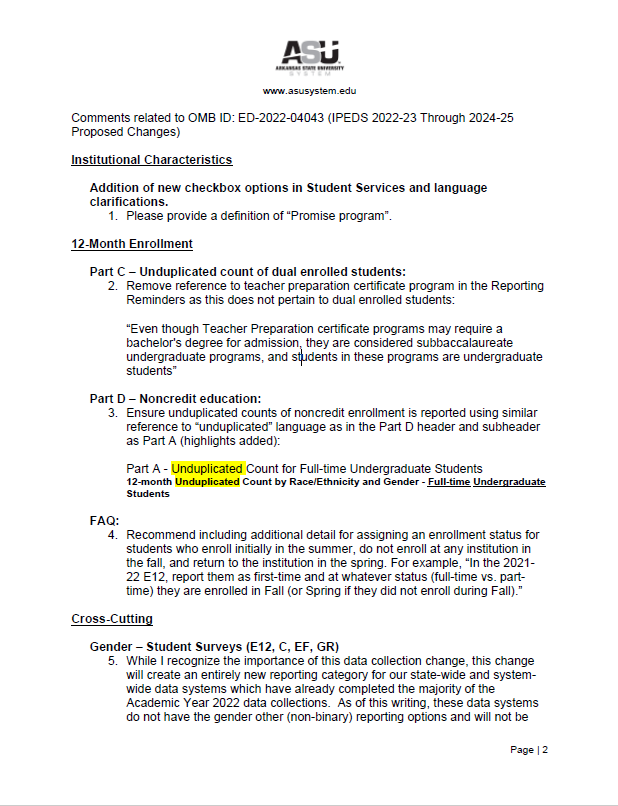
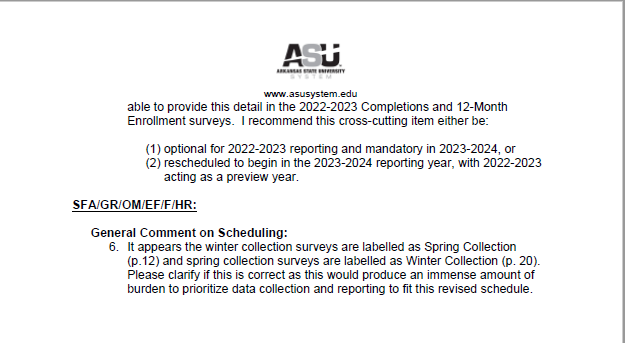
Document: ED-2022-SCC-0026-0009
Received: March 21, 2022
Posted: March 22, 2022
Category: Institution of Higher Education
Submitter Information
Name: Anonymous Anonymous
General Comment
(1) Is this collection necessary to the proper functions of the Department?
- Absolutely! To make sure our delivery of post-secondary education is efficacious and inclusive, it is imperative that the government/Department collect data regarding a variety of aspects of said education. Accurate data collection is ESSENTIAL to the maintenance of good practices, as well as to making beneficial changes in current practices. Without data, we will flounder - and a floundering higher education system would not be beneficial for the future of our children or our country..
(4) How might the Department enhance the quality, utility, and clarity of the information to be collected?
(a) The current IPEDS data gives an incomplete picture of people with disabilities at colleges and universities. IPEDS collects data on "undergraduates formally registered as students with disabilities," which primarily includes students who are already registered with disability services (generally, in order to receive accommodations). However, not all disabled undergraduate students formally register as having a disability. In fact, various forms of disability are widespread among college students - and relatively few of these students end up "making it official" by registering their disabilities with university services. Thus, collected data has not been representative of real-life student situations. Students with disabilities may choose not to officially register themselves for a variety of reasons, including thinking their disability isn't "bad" enough, not wanting to go through the giant hassle that is the registration process, and much more. Additionally, official registration involves a great deal of energy, time, stress, required consultation with medical professionals and school officials, and much more. This is a huge burden to place on the shoulder of disabled students. We cannot continue to place the onus of responsibility - for registration, for reporting educational conditions to the government, and so much more - on the shoulders of students who are already frequently marginalized, stigmatized, and overwhelmed due to dealing with their disability experiences. If it does not include students who are NOT officially registered with disability services, IPEDS data will end up being under-representative, and will misrepresent the realities of students today.
(b) Additionally, IPEDS does not collect disability data from graduate students, faculty, or staff - which seems like a large oversight. Data about these "categories" of people could provide very valuable insights.
(c) Expanded IPEDS disability data is necessary to identify and address inequities at higher education institutions. People with disabilities are a huge minority group in our country. Students with disabilities have unique needs, and you all are in a position to help. Please ask more questions, collect more data, and help our students flourish! Also, if there are questions about what questions to ask and what data to collect, please consult the disability community. Including disabled representatives in the processes of question formation and data collection is the first step towards getting more, better, and more useful information.
(d) In sum, IPEDS could improve disability data collection by:
- Expanding data collection on disability accommodations to include students NOT registered with disability services.
- Expanding data collection on disability accommodations to include graduate students, faculty, and staff.
- Adding disability questions as a core demographic element and collecting this information from all undergraduates, graduate students, faculty, and staff.
- Partnering with the disability community to develop strategies for developing questions, and collecting and utilizing data.
Thank you for your time and the important work you do!
Document: ED-2022-SCC-0026-0010
Received: April 01, 2022
Posted: April 04, 2022
Submitter Information
Name: Anonymous Anonymous
General Comment
I am pleased to see that NCES is recognizing the nuances of gender identity, but I strongly urge the use of less stigmatizing language than "gender other." Perhaps "students with another gender identity" would appropriate and respect the dignity of our nonbinary students.
Document: ED-2022-SCC-0026-0011
Received: April 01, 2022
Posted: April 04, 2022
Category: Community Organization
Submitter Information
Name: Lien Vu
General Comment
This is a great step in the right direction! I greatly appreciate NCES recognizing that gender is not binary, but a little more work can be done to have all questions be inclusive of nonbinary students. Another easy change is to use less stigmatizing language than “gender other” (such as “nonbinary students” or “students with another gender identity”). Being called "other" in any capacity is marginalizing and undermines your very effort to promote inclusivity.
Document: ED-2022-SCC-0026-0012
Received: April 01, 2022
Posted: April 04, 2022
Category: Federal Agency
Submitter Information
Name: Jay Garvey
General Comment
I appreciate revisions to IPEDS recognizing that gender is not a binary. Such a change will have important implications for policy, administrative initiatives, and longitudinal data collection/analysis. However, "gender other" is a harmful phrase that further stigmatizes nonbinary students by literally "othering" people. Current data practices in higher education instead promote phrases like "students with another gender identity" or "nonbinary students" (see https://muse.jhu.edu/article/733633/summary and https://eric.ed.gov/?id=EJ1083988 for more information). I encourage more affirming (and less stigmatizing) gender language with these proposed IPEDS revisions.
Document: ED-2022-SCC-0026-0013
Received: April 01, 2022
Posted: April 04, 2022
Category: Other
Submitter Information
Name: Anonymous Anonymous
General Comment
I appreciate NCES efforts to recognize non-binary genders. However, the forms should include inclusive language rather than "gender other." Language like non-binary or gender-nonconforming is less stigmatizing.
Document: ED-2022-SCC-0026-0014
Received: April 01, 2022
Posted: April 04, 2022
Category: Four-Year Public Institution of Higher Education
Submitter Information
Name: Morgan Seamont
General Comment
I learned today of your progress in recognizing multiple genders beyond the binary. I applaud that effort but would highly encourage you to use more inclusive language than "gender other." More inclusive language and options could be added to respect and get an accurate representation of gender for this important data collection point.
Document: ED-2022-SCC-0026-0015
Received: April 01, 2022
Posted: April 04, 2022
Category: Four-Year Public Institution of Higher Education
Submitter Information
Name: Nic Francisco
General Comment
It's great that NCES/IPEDS will be collecting gender data beyond the binary categories of Man/Woman. This is really important for capturing more accurate data. That being said, it would be great if the additional category were less "othering." This could be as simple as changing to option language to "non-binary."
Document: ED-2022-SCC-0026-0016
Received: April 01, 2022
Posted: April 04, 2022
Category: Civil Rights
Submitter Information
Name: Anonymous Anonymous
General Comment
As the director of a campus LGBTQ+ center, I am thrilled NCES is recognizing gender is not a binary for the first time. However, using the harmful language of 'gender other' should be changed to 'students with another gender identity' or 'nonbinary.' Moreover, all questions must include nonbinary students. This population is growing at a significant rate at many institutions and needs to be included to truly represent who college students are today.
Document: ED-2022-SCC-0026-0017
Received: April 02, 2022
Posted: April 04, 2022
Category: Other
Submitter Information
Name: Leann Fenneberg
General Comment
I am really excited to see the proposed IPEDS data reporting being more inclusive of all gender identities. Thank you!
With that said, I urge you to avoid the term "gender other" which can clearly be "other-ing" for people who are not on the gender binary.
Could you consider language such as nonbinary students? Or students who identify with another gender identity?
Thank you for considering this important act of promoting inclusion.
Document: ED-2022-SCC-0026-0018
Received: April 04, 2022
Posted: April 06, 2022
Category: Other
Submitter Information
Name: Danielle Officer
General Comment
I appreciate NCES recognizing that gender is not a binary, but that they need to go further and have all questions be inclusive of nonbinary students. I encourage you to use less stigmatizing language than “gender other” (such as “nonbinary students” or “students with another gender identity”).
Document: ED-2022-SCC-0026-0019
Received: April 04, 2022
Posted: April 06, 2022
Category: Student
Submitter Information
Name: Katy Collins
General Comment
I appreciate NCES recognizing that gender is not a binary, but they need to go further and have all questions be inclusive of nonbinary students. Additionally, they could use less stigmatizing language than “gender other” (such as “nonbinary students” or “students with another gender identity”).
Document: ED-2022-SCC-0026-0020
Received: April 04, 2022
Posted: April 06, 2022
Category: Civil Rights
Submitter Information
Name: Christina Chala
General Comment
I want to say how much I appreciate NCES recognizing that gender is not a binary! But I also need to share that NCES needs to go further and have all questions be inclusive of nonbinary students. And NCES needs to use less stigmatizing language than “gender other." Some suggested alternatives: “nonbinary students” or “students with another gender identity." I am a university representative on a university wide LGBTQI+ Council, and this is very important to the work that we do to create a safe and inclusive learning environment for our students. Thank you!
Document: ED-2022-SCC-0026-0021
Received: April 04, 2022
Posted: April 06, 2022
Submitter Information
Name: Anonymous Anonymous
General Comment
Although I appreciate the recognition of non-binary folks, I believe the organization needs to go further and hall all questions be inclusive of non-binary students. Additionally, using the term "gender other" is not appropriate. Consider shifting language to "nonbinary" or "student with another gender identity".
Document: ED-2022-SCC-0026-0022
Received: April 04, 2022
Posted: April 06, 2022
Category: Teacher
Submitter Information
Name: Anonymous Anonymous
General Comment
I appreciate NCES recognizing that gender is not binary, but you need to go further and have all questions be inclusive of nonbinary students. Studying LGBTQ+ students it is important to them that they are recognized for who they are.
Document: ED-2022-SCC-0026-0023
Received: April 04, 2022
Posted: April 06, 2022
Category: Teacher
Submitter Information
Name: Anonymous Anonymous
General Comment
I appreciate NCES recognizing that gender is not binary, but you need to go further and have all questions be inclusive of nonbinary students. Studying LGBTQ+ students it is important to them that they are recognized for who they are.
Document: ED-2022-SCC-0026-0024
Received: April 04, 2022
Posted: April 06, 2022
Category: Teacher
Submitter Information
Name: Anonymous Anonymous
General Comment
I appreciate NCES recognizing that gender is not binary, but you need to go further and have all questions be inclusive of nonbinary students. I study LGBTQ+ students and by being inclusive you help them to be recognized and seen. Gender other is not the answer and is not appropriate language.
Document: ED-2022-SCC-0026-0025
Received: April 04, 2022
Posted: April 06, 2022
Category: Institution of Higher Education
Submitter Information
Name: Andrew Eppig
General Comment
I strongly support the NCES changing its gender question to include non-binary students. This is a long-needed change to better support non-binary students. If possible, I would encourage NCES to change the "Gender other" category to two categories ("Gender non-binary" and "Gender different identity") to reduce stigma/othering and to allow for more specific reporting.
Document: ED-2022-SCC-0026-0026
Received: April 04, 2022
Posted: April 06, 2022
Category: Private/Non-Profit Institution of Higher Education
Submitter Information
Name: Kayla Lisenby
General Comment
While I appreciate the expansion of the gender data fields to include identities beyond man and woman, the phrasing 'Gender other' is stigmatizing and, quite literally othering, for the nonbinary, genderqueer, genderfluid, and additional diverse gender experiences that may select this marker. 'Nonbinary, genderqueer, or additional gender not listed' would be a more affirming use of language to support these students and gather this critical data.
Document: ED-2022-SCC-0026-0027
Received: April 05, 2022
Posted: April 06, 2022
Category: Individual
Submitter Information
Name: Nicholas Tapia-Fuselier
General Comment
I appreciate NCES recognizing that gender is not a binary, but NCES must have all questions be inclusive of nonbinary students. That inclusion would necessitate avoiding stigmatizing language such as “gender other." Items like “nonbinary students” or “students with another gender identity” would be much more appropriate and inclusive.
Document: ED-2022-SCC-0026-0028
Received: April 05, 2022
Status: Posted
Category: Student
Submitter Information
Name: Crystal Garcia
General Comment
Recognizing gender exists outside of the binary is a good step for NCES, however "gender other" is dehumanizing and reinforces stigmas for nonbinary students. I encourage NCES to use less stigmatizing language such as "gender nonbinary," “nonbinary students,” or “students with another gender identity."
Document: ED-2022-SCC-0026-0029
Received: April 05, 2022
Posted: April 06, 2022
Category: Institution of Higher Education
Submitter Information
Name: Lynn Vidler
General Comment
I appreciate NCES recognizing that gender is not a binary, but you need to go further and have all questions be inclusive of nonbinary students.
Please use less stigmatizing language than “gender other” (such as “nonbinary students” or “students with another gender identity”).
Document: ED-2022-SCC-0026-0030
Received: April 06, 2022
Posted: April 07, 2022
Submitter Information
Name: Staff Member
General Comment
While I think this provides for some great progress as it relates to recording the actual gender identities of our students, it would be great to see the assessment go further in aligning itself with the ways in which our students identify and the labels used. Minimally, we should move away from the othering language of using "other genders."
Document: ED-2022-SCC-0026-0031
Received: April 06, 2022
Posted: April 07, 2022
Category: Four-Year Public Institution of Higher Education
Submitter Information
Name: Sara Bliss
General Comment
Thank you for expanding the IPEDS gender category options to include students who identify outside of the gender binary. This will not be a burden for our institution whatsoever and will facilitate much needed updates in our data collection systems. I encourage you to please consider updating the proposed language from 'gender other' to language that is more inclusive such as 'non-binary' or 'students with another gender identity.' Based on a recent representative surveys at our large public R1 institution, we know that many of our students identify outside of the gender binary and that being referred to as 'other' has harmful effects on their well-being and our ability to support them throughout their college experience. I also encourage you to consider updating all other IPEDS questions/data fields to include affirming (not 'other') response options outside for students, faculty, and staff who identify outside of the gender binary. Thank you for your consideration of and attention to this important issue.
Document: ED-2022-SCC-0026-0032
Received: April 08, 2022
Posted: April 11, 2022
Category: Institution of Higher Education
Submitter Information
Name: Laura Driscoll
General Comment
I appreciate that NCES is recognizing that gender is not a binary, however please consider using less stigmatizing language as "gender other". I would suggest "nonbinary students" or "students with another gender identity"
Document: ED-2022-SCC-0026-0033
Received: April 10, 2022
Posted: April 11, 2022
Submitter Information
Name: Richard Romano
General Comment
I am a researcher who uses IPEDS in my work on higher education finance issues. A retired community college faculty/administrator, I am now an affiliated faculty member at the Cornell Higher Education Research Institute at Cornell University and a research associate in the economics department at Binghamton University (SUNY). My brief comments are in reference to the language found in Appendix A concerning noncredit education.
In the last few years I have been writing about noncredit enrollments at the community college level, and thus I welcome your initiative to collect data on this important part of the community college mission. I believe that some of my research has been used to inform your decision to start collecting this new data. Information on the variables obtained will help us understand the role that noncredit courses play in training the modern workforce and in developing productive citizens. In addition, it is an important first step toward correcting an error within the IPEDS data which makes the per FTE figures used for research and benchmarking inaccurate.
Table 1- ICH 5, p. 6. You list developmental education but don’t use the word remedial. In other places you use only the word remedial. These 2 terms may not be interchangeable. Decide if this is what you want or change all to--- developmental/remedial education.
Table 3, Part D- noncredit education, p. 10. I am worried about double counting here. Some remedial and ESL courses do not count toward a degree but are reported to IPEDS. They are offered for institutional credit and can be counted for financial aid purposes. Do you want the total of noncredit, non-degree enrollments or only those that are not currently reported to IPEDS?
Land Grant universities generate a lot of noncredit activity particularity through cooperative extension. This activity is often reported to the university and the state as noncredit enrollment. Do you want these reported to IPEDS? If not, give direction on this point. From my limited research, it appears that the revenues and expenditures from this activity are not in university budgets and thus not reported to IPEDS. In this case, in my opinion, noncredit enrollments/hours should not be reported.
Thank you again for your attention to this important addition to IPEDS. I look forward to using the results of your efforts.
Document: ED-2022-SCC-0026-0034
Received: April 11, 2022
Posted: April 12, 2022
Category: Association/Organization
Submitter Information
Organization: Campus Pride
General Comment
April 22, 2022
U.S. Department of Education Comment Request; Integrated Postsecondary Education Data System (IPEDS) 2022-23 Through 2024-25
On behalf of Campus Pride, the leading national nonprofit organization working to create a safer college environment for LGBTQ+ students, we would like to offer the following comments on NCES’ proposed student survey question that asks, “Gender other (i.e., gender information is known but does not fall into either of the mutually exclusive binary categories provided [Men/Women]).”
We feel that this change is critically important because more and more students are identifying as nonbinary. For example, the number of students identifying as trans or nonbinary on the American College Health Association’s National College Health Assessment (NCHA) has nearly tripled in the last five years, with most of this increase because of the growth in respondents identifying as nonbinary. Other national surveys of college students, such as the Multi-Institutional Study of Leadership (MISL), the National Survey of Student Engagement (NSSE), the Student Experience in the Research University (SERU), and Cooperative Institutional Research Program (CIRP) Freshman Survey, also ask gender identity and have seen a significant increase in students indicating that they are nonbinary.
A growing number of institutions are collecting data on the gender identity of their students, especially with Common App now including an optional question on gender. The NCES change enables the colleges that currently collect data on gender identity to be able to share this information and it signals to other institutions that they should be collecting the data.
While we endorse the inclusivity offered by the addition of the category “gender other,” we encourage you to change the name of the category to “nonbinary gender identity” or “another gender identity” to avoid the stigmatizing effect of referring to a group as “other.”
Collecting cross-cutting data on the number of students who identify beyond a gender binary is an important change, but it is only a first step. NCES needs to include a nonbinary category in all IPEDS data tables, as the NCHA does in its reports. The importance of documenting the academic performance of students who identify as nonbinary is significant and should outweigh any additional institutional reporting burden.
Thank you for reading and considering our comments.
Sincerely,
Shane Windmeyer, Executive Director, Campus Pride
Genny Beemyn. Coordinator, Campus Pride Trans Policy Clearinghouse
Attachments
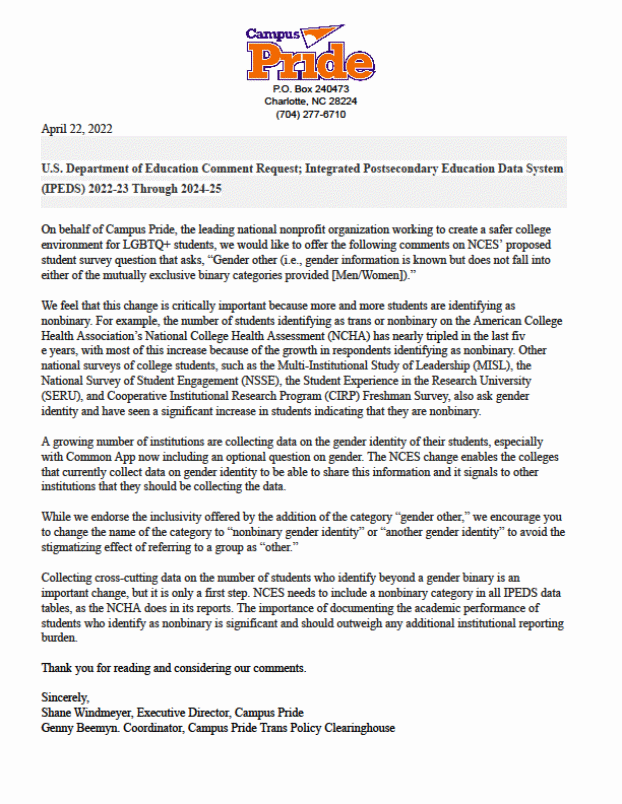
Document: ED-2022-SCC-0026-0035
Received: April 12, 2022
Posted: April 13, 2022
Category: Four-Year Public Institution of Higher Education
Submitter Information
Government Agency Type: State
Government Agency: SUNY - Binghamton University
General Comment
As an Assistant Director of a college LGBTQ+ Resource Center, I greatly appreciate the expansion of the gender data fields to be more inclusive of today's college students. However, the phrasing 'Gender other' is stigmatizing and, quite literally othering, for the nonbinary, genderqueer, genderfluid, and additional diverse gender experiences that may select this marker. 'Nonbinary, genderqueer, or additional gender not listed' would be a more affirming use of language to support these students and gather this critical data.
Document: ED-2022-SCC-0026-0036
Received: April 13, 2022
Posted: April 14, 2022
Category: Institution of Higher Education
Submitter Information
Organization: American College Health Association
General Comment
ACHA recommends adding the following questions to the IPEDS, with our reasoning in the following paragraphs:
• Does your institution provide students with access to health care, including through contractual arrangements with off-campus and/or external providers?
• Does your institution have a student health services center on campus?
• Does your institution provide students with access to mental health counseling, including contractual arrangements with off-campus and/or external providers?
• Does your institution offer mental health counseling services on campus?
• Does your institution offer health/well-being prevention education?
• If yes,
Does your health/well-being prevention education align with a holistic framework?
Is your health/well-being prevention education offered campus-wide?
IPEDS serves as the primary source for information on US colleges, universities, and technical and vocational institutions. As colleges have taken on a greater and more important role in helping ensure the health and well-being of its students, it is important that IPEDS include questions related to students’ access to health care services and mental health counseling.
Introducing such a line of questions in data collection efforts would accomplish two goals: 1) providing the public with useful, comparable information regarding campus health and well-being services, and 2) allowing institutions to better assess their impact on fostering student well-being.
To decide which institution provides any given student the best chance of success, it is important to provide a wide degree of information from which to make such a decision. As students evaluate their various needs and wants, having information regarding an institution’s available health and well-being services could serve as important factors, particularly for students with disabilities and/or other health and well-being needs. Including questions about such in IPEDS fits with the goal of providing important data to students and parents.
Additionally, including questions related to health and well-being services can help colleges make an honest assessment and review of their services to help inform the allocation of time and resources to help improve their students’ health and well-being. In this way, including questions related to student health and well-being can lead to improvements of student populations’ academic performance, physical well-being, and mental health.
Now more than ever, we must work on supporting all aspects of our college students’ health. Currently, the college student population in the United States faces a wide array of adverse factors that can impact their academic performance and health. Recent data collected by the nationally recognized Healthy Minds Survey finds that nearly half of all college students (47%) are struggling with clinically-significant anxiety or depression, but only 40 percent of those students have had any mental health counseling or therapy in the past year. Furthermore, research from the Hope Center for College, Community, and Justice shows that one in three students experience anxiety, and one in three experience depression. These mental health concerns are urgent and require our attention.
Access to physical and mental health care can often be difficult for students. Increasing rates of mental health concerns, crises, and diagnoses have demonstrated that students often cannot access the resources and treatment they need. Additionally, disparities in access to health care further exasperate the situation. For example, underrepresented students, especially Black, Latinx, and LGBTQ students, face much greater barriers to accessing mental health resources and treatment. The conglomeration of all these factors impact our students and therefore require institutions to adapt and provide the necessary care to maintain the health and well-being of the student population.
For more detailed input and comments please see enclosed letter under the attachment sections.
Attachments
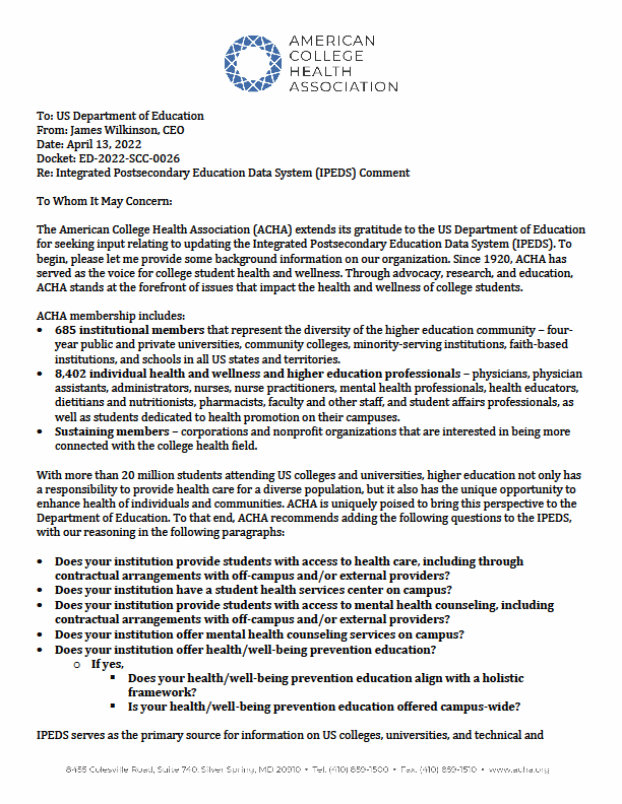
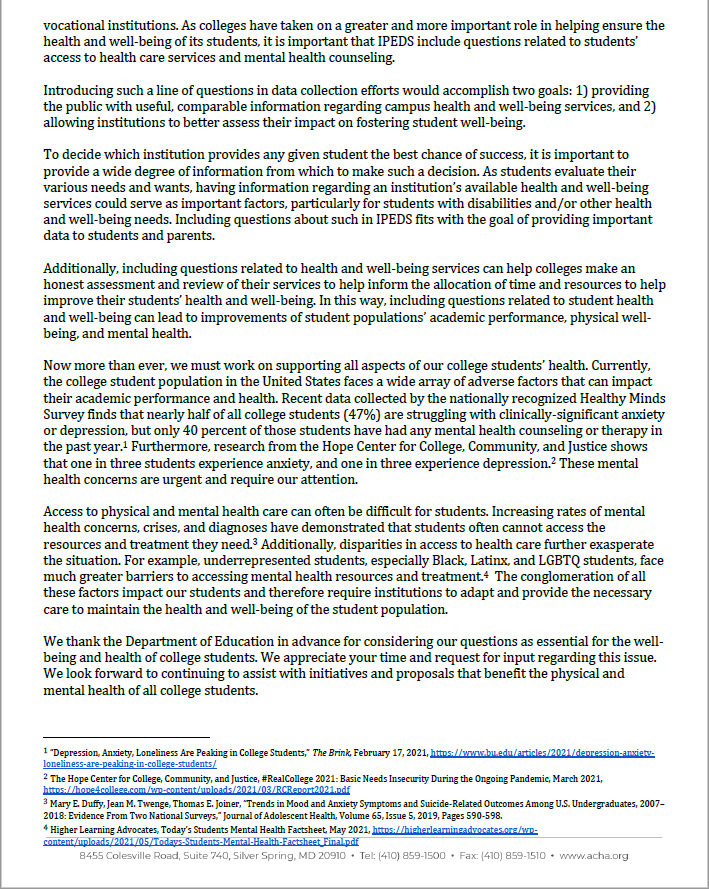
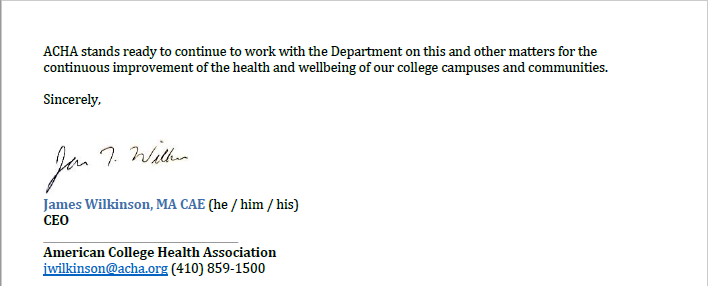
Document: ED-2022-SCC-0026-0037
Received: April 18, 2022
Posted: April 19, 2022
Submitter Information
Name: Bonnielin Swenor
General Comment
The current IPEDS data gives an incomplete picture of people with disabilities at colleges and universities. IPEDS collects data on "undergraduates formally registered as students with disabilities", which primarily includes students registered with disability services to receive accommodations. However, not all disabled undergraduate students formally register as having a disability, and IPEDS does not collect disability data from graduate students, faculty, or staff.
Expanded IPEDS disability data is necessary to identify and address disability inequities in higher education. IPEDS could improve disability data collection by:
(1) Expanding data collection on disability accommodations to include graduate students, faculty, and staff;
(2) Adding disability questions as a core demographic element and collecting this information from undergraduates, graduate students, faculty, and staff; and (3) Partnering with the disability community to develop strategies for collecting and utilizing these data.
Document: ED-2022-SCC-0026-0038
Received: April 20, 2022
Posted: April 21, 2022
Submitter Information
Name: kate jerman
General Comment
As someone for whom NCES data is very important and who wishes, almost daily, that the data were more inclusive, I applaud this change. I appreciate NCES recognizing that gender is not a binary, but this needs to go further and have all questions be inclusive of nonbinary students.
I also encourage NCES to use less stigmatizing language than “gender other”. Alternatives could include “nonbinary students” or “students with another gender identity”). These changes are significant improvements to the way NCES currently collects data and I encourage their adoption as fast as possible.
Document: ED-2022-SCC-0026-0039
Received: April 21, 2022
Posted: April 25, 2022
Category: Institution of Higher Education
Submitter Information
Name: Cortney Johnson
General Comment
I appreciate NCES recognizing that gender is not a binary, but that you need to go further and have all questions be inclusive of nonbinary students.
Please use less stigmatizing language for students who may not identify with the options you give, “gender other” is not acceptable. You could use “nonbinary students” or “students with another gender identity”.
Document: ED-2022-SCC-0026-0040
Received: April 22, 2022
Posted: April 25, 2022
Category: Association/Organization
Submitter Information
Organization: Advance CTE & ACTE
General Comment
On behalf of Advance CTE, the nation’s longest-standing not-for-profit representing State Directors and leaders responsible for secondary, postsecondary and adult Career Technical Education (CTE) across all 50 states and U.S. territories and the Association for Career and Technical Education (ACTE), the nation’s largest not-for-profit association committed to the advancement of education that prepares youth and adults for career success, we are writing in response to proposed changes to future planned data collections as part of the Integrated Postsecondary Education Data System (IPEDS).
As you are aware, IPEDS is a key source of information about program enrollments, completion, equity and other important aspects of the nation’s postsecondary education system. These data provide critical insights into how our collective postsecondary education investments impact learners and, equally as vital, this information can help families and students themselves navigate complex systems to make choices that best meet their unique needs.
To help in meeting these important goals, our organizations were strongly encouraged by the proposed changes related to noncredit education, student employment, dual enrollment and financial aid data on non-degree-seeking learners. We have provided full comments in the attached PDF.
In addition, our organizations have broader recommendations for future IPEDS data collections that we believe will help educators and policymakers better leverage data for change, including disaggregation across survey components by race/ethnicity, gender identity and disability status as well as requiring Outcome Measures for non-degree-granting institutions.
Please see our full response in the attached PDF. We appreciate your time and consideration of our comments and recommendations. Should you have any questions or would like to discuss the issues raised in this letter further, please do not hesitate to contact ACTE’s Research Director, Catherine Imperatore ([email protected]), or Advance CTE’s Policy Advisor, Steve Voytek ([email protected]).
Sincerely,
LeAnn Wilson
Executive Director
ACTE
Kimberly A. Green
Executive Director
Advance CTE
Attachments
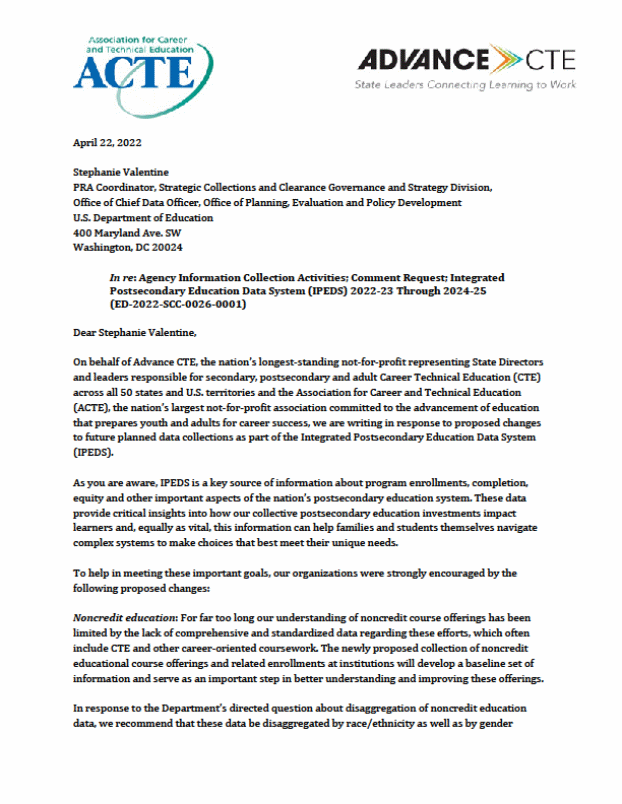
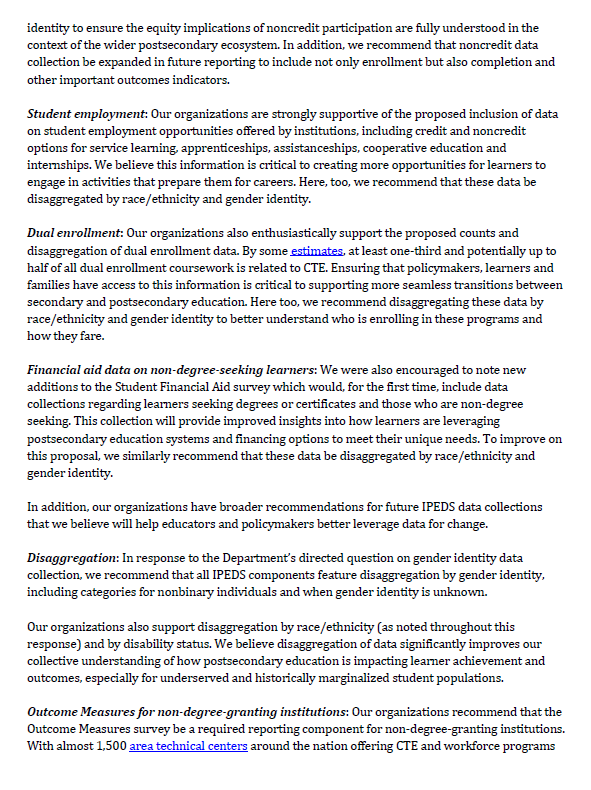
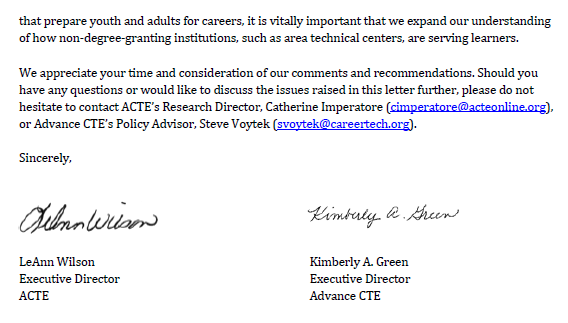
Document: ED-2022-SCC-0026-0041
Received: April 22, 2022
Posted: April 25, 2022
Category: Education Consultant
Submitter Information
Name: Richard Voorhees
General Comment
I salute efforts at the National Center for Education Statistics to begin to collect noncredit enrollment data through one or more of the mandatory surveys that are part of the Integrated Postsecondary Education Data System (IPEDS).
Attachments
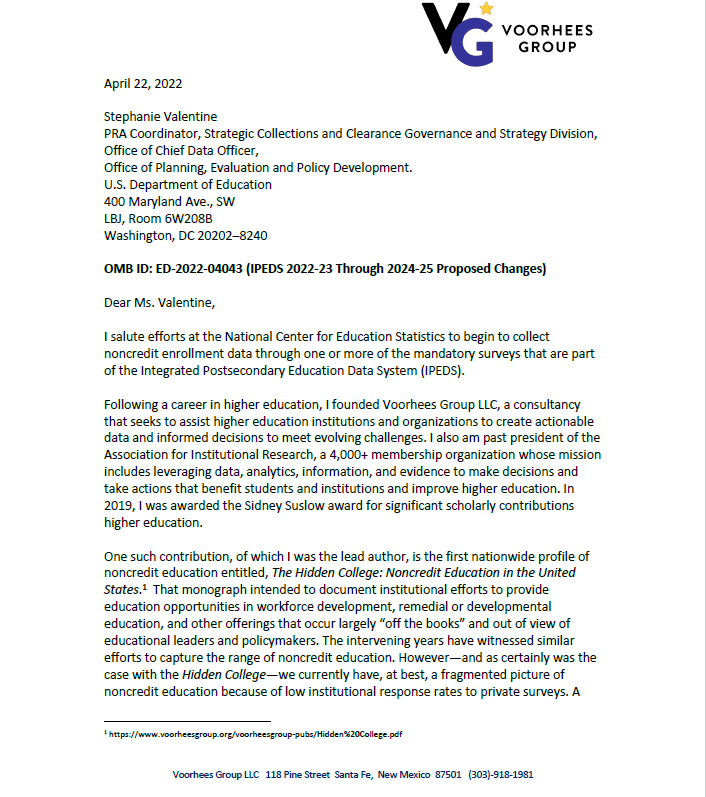
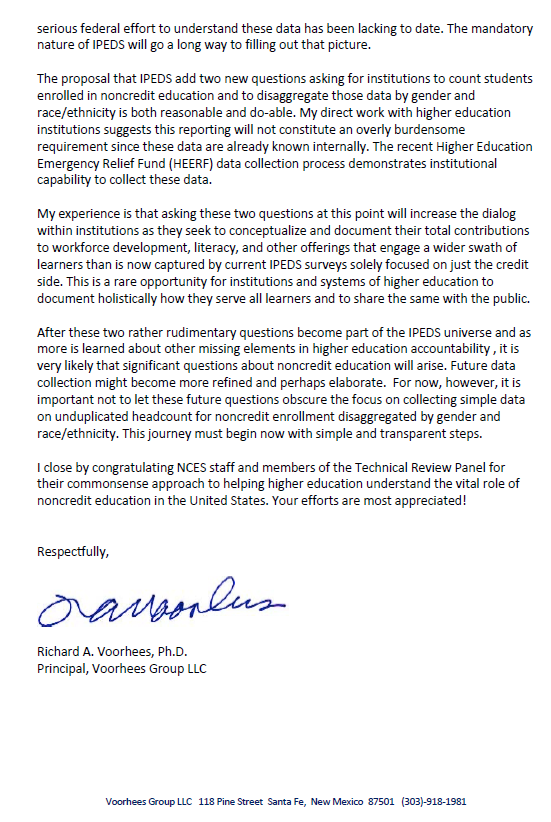
Document: ED-2022-SCC-0026-0042
Received: April 22, 2022
Posted: April 25, 2022
Category: Private/Non-Profit Institution of Higher Education
Submitter Information
Name: Anonymous Anonymous
General Comment
Although I welcome the inclusivity of adding an additional gender category, it will be highly burdensome for our institution to implement this reporting accurately in the 2022-2023 reporting year. Our current collection and data processing of sex/gender data is not designed to support this survey change. Updating our systems to collect this additional data, resurvey our existing population, and feed the information through our data and reporting flows requires a significant investment of time and coordination across multiple university offices. To get such instruments in place over the summer would require a serious scramble, and would likely result in poor data quality this first year anyway. Therefore, we would greatly prefer this change to wait (or be optional) until the 2023-2024 or 2024-2025 reporting cycles.
Document: ED-2022-SCC-0026-0043
Received: April 22, 2022
Posted: April 25, 2022
Submitter Information
Organization: Lumina Foundation
General Comment
Please see the attached letter for comments.
Attachments
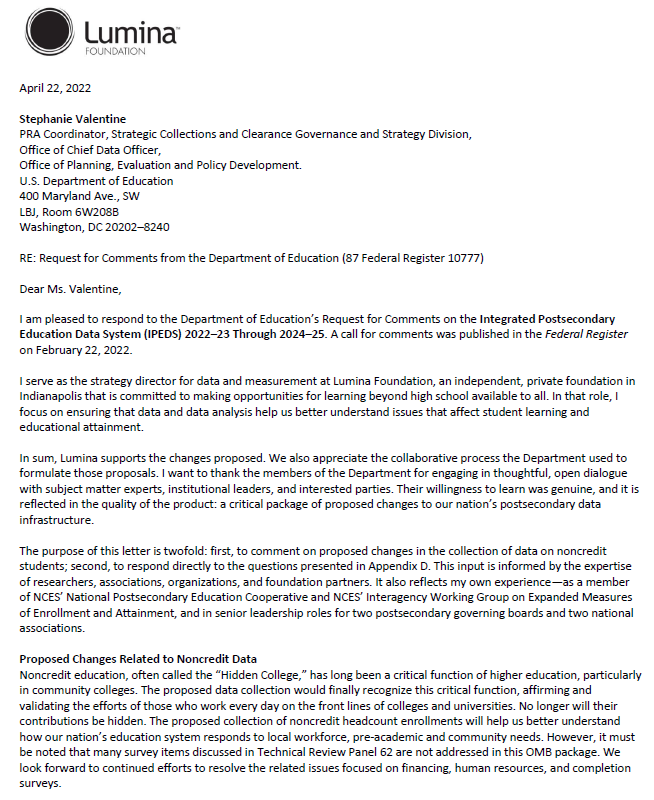
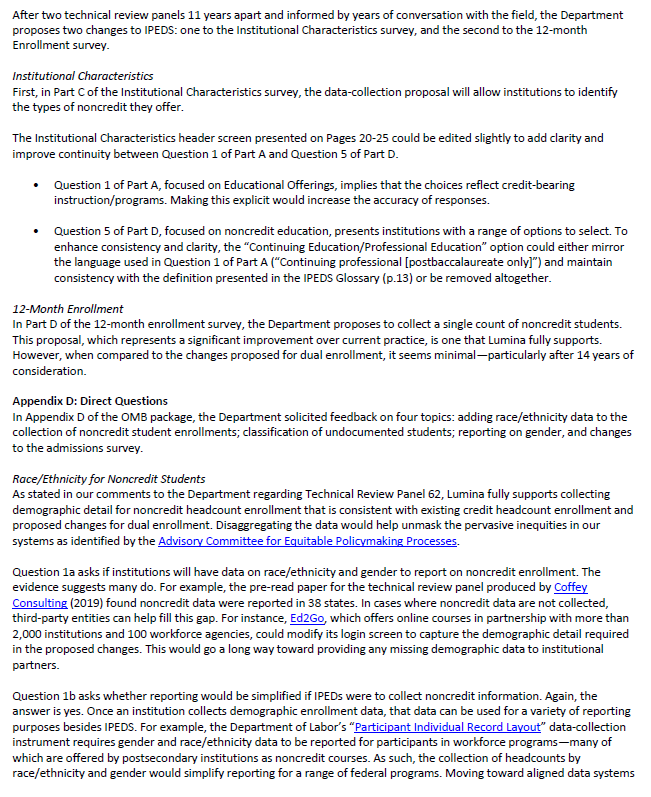
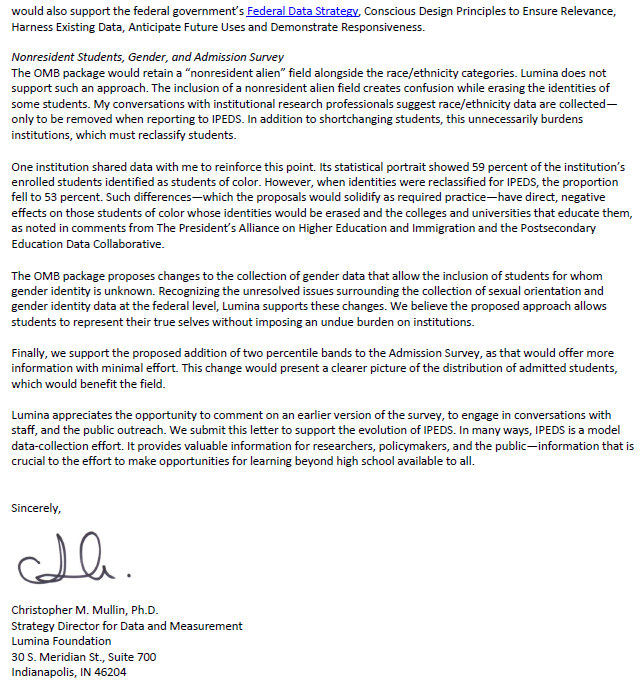
Document: ED-2022-SCC-0026-0044
Received: April 22, 2022
Posted: April 25, 2022
Category: Institution of Higher Education
Submitter Information
Name: Anonymous Anonymous
General Comment
RE "Test scores percentile collection in Admissions survey component" - with so many institutions either going test-optional or removing this requirement altogether, this SAT and ACT scores are becoming less and less relevant. For those students who choose to report their scores, most likely it will skew to the higher scores, thus invalidating this measure. Adding 10th and 90th percentiles just adds to our reporting burden. I suggest removing this section completely. If it will stay, then add a field indicating how many students (percent of admitted students) the scores represent.
Document: ED-2022-SCC-0026-0045
Received: April 22, 2022
Posted: April 25, 2022
Category: Institution of Higher Education
Submitter Information
Name: Anonymous Anonymous
General Comment
Gender question being proposed:
RE "Of the total students reported, how many students did you allocate to a binary gender category (Men/Women) because their gender was unknown or other than the provided categories?" - why ask another question? It would be more efficient to expand the gender categories.
Document: ED-2022-SCC-0026-0046
Received: April 25, 2022
Posted: April 25, 2022
Category: Other
Submitter Information
Name: Ty McNamee
General Comment
I feel as though this change is unnecessary and harmful. Undocumented students do have racial/ethnic identities, just as we all do. It is harmful because it could skew data as to how many students of color are being served at an institution. It also seems like a way for the government to track and punish undocumented students and their families, further creating fear for these people.
Document: ED-2022-SCC-0026-0047
Received: April 25, 2022
Posted: April 26, 2022
Category: Four-Year Public Institution of Higher Education
Comment on FR Doc # 2022-04043
Submitter Information
Organization: University of California System
General Comment
Please see attached letter.
Attachments
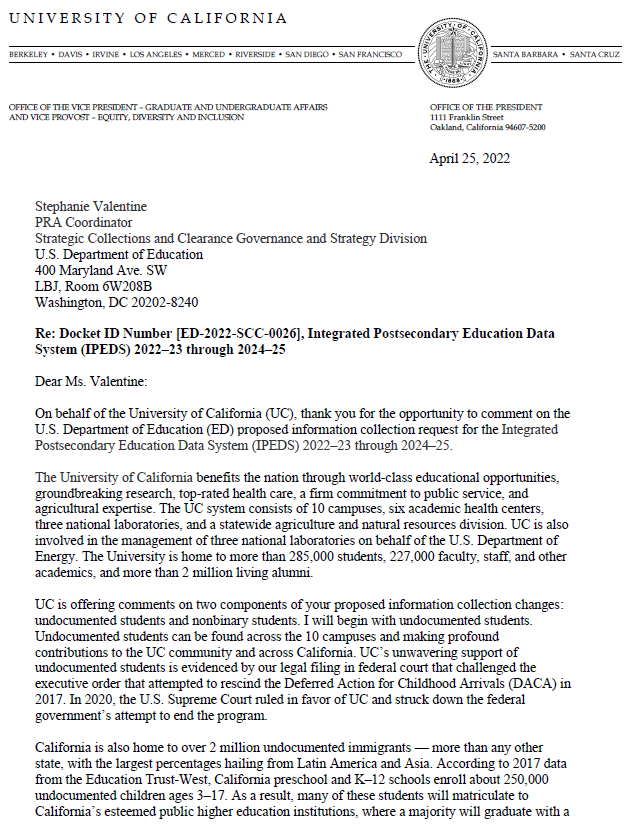
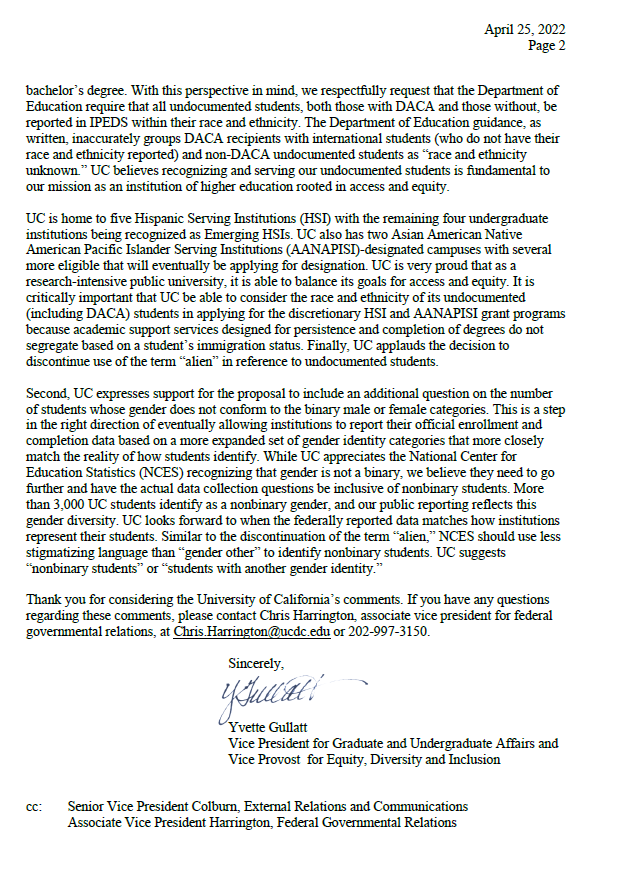
Document: ED-2022-SCC-0026-0048
Received: April 25, 2022
Posted: April 26, 2022
Category: Institution of Higher Education
Submitter Information
Name: Andy Cofino
General Comment
I greatly appreciate that NCES is finally recognizing nonbinary people (in alignment with many state and federal laws/policies), but the language of "gender other" is inaccurate and stigmatizing. Instead, to be consistent with law, "nonbinary" would be appropriate. Or you can say: "students with another gender identity." This would allow for consistency with law, more accuracy, and language that does not further marginalize an already highly marginalized student population.
Attachments
Screenshot
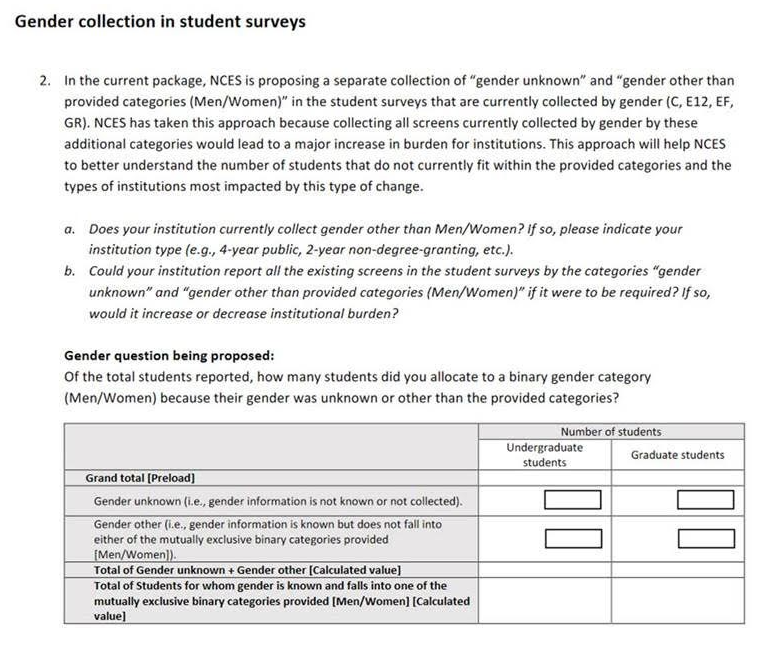
Document: ED-2022-SCC-0026-0049
Received: April 25, 2022
Posted: April 26, 2022
Category: State Advocacy Organization
Submitter Information
Name: Elizabeth Brand
General Comment
The proposed changes to IPEDS reporting regarding making undocumented students as "race/ethnicity unknown" or "non resident" is more than a bad idea. Not only will it skew racial counts needed for institutions to qualify for federal funding as MSIs, but it also opens the door for some of the most marginalized students to be targeted should a governing body decide to do so. These changes must not occur.
Document: ED-2022-SCC-0026-0050
Received: April 25, 2022
Posted: April 26, 2022
Category: Other
Submitter Information
Name: Anonymous Anonymous
General Comment
-The definition of race/ethnicity in IPEDS should be updated. Race and ethnicity have nothing to do with citizenship. As such, the race/ethnicity glossary definition should remove this language: "The designations are used to categorize U.S. citizens, residents aliens, and other eligible noncitizens." Race/ethnicity should be applied to all students, regardless of citizenship or immigration status. It should not be limited only to those who are authorized to be in the US. This will do two things: 1. It will accurately quantify how many BIPOC students an institution has, which will more accurately determine which schools are minority-serving institutions. 2. It will not 'out' anyone based on their immigration status or lack of legal status.
-In addition, the proposal to classify the race/ethnicity of undocumented students that don't have DACA as 'race/ethnicity unknown' should be removed. This proposed guidance (FAQ #20) combines race/ethnicity with immigration status when they are two separate things. I propose that you remove this FAQ completely. In addition, many institutions do not know when a student is undocumented - asking them to categorize a student as undocumented puts them in a position to ask about immigration status when it is unnecessary - especially in states like Washington, where the AG's office has advised institutions to not ask immigration status questions when possible.
Document: ED-2022-SCC-0026-0051
Received: April 25, 2022
Posted: April 26, 2022
Category: Institution of Higher Education
Submitter Information
Government Agency Type: State
Government Agency: University of Maryland President's Commission on LGBTQ+ Issues
General Comment
On behalf of the University of Maryland's President's Commission on LGBTQ+ Issues I am providing the attached letter of support for expanding gender reporting fields to more accurately collect data on trans and non-binary students in higher education.
Attachments
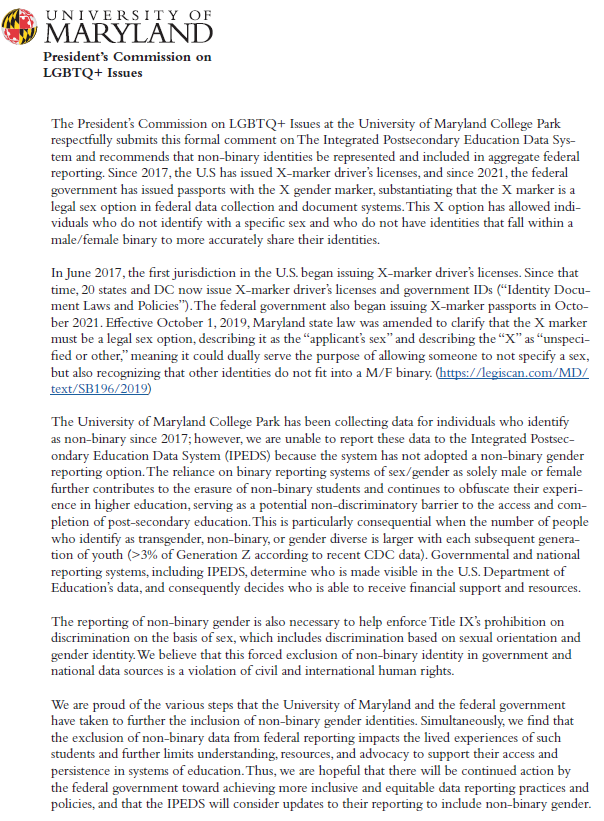
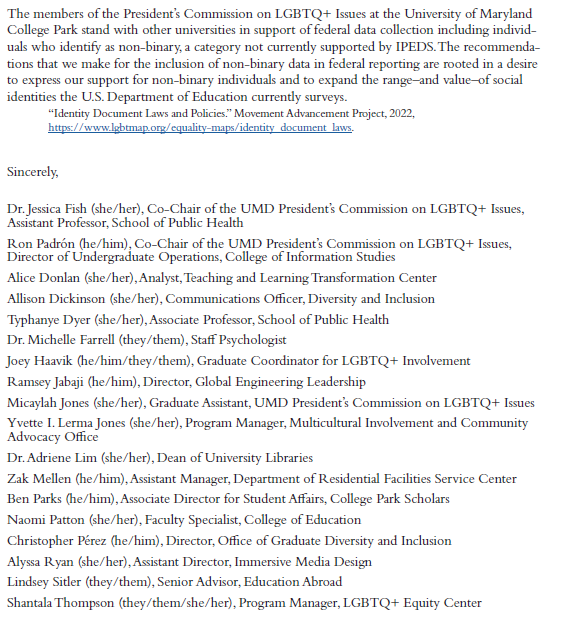
Document: ED-2022-SCC-0026-0052
Received: April 25, 2022
Posted: April 26, 2022
Category: National Advocacy Organization
Submitter Information
Organization: Campus Pride & 36 Other National/Regional Orgs
General Comment
Campus Pride and the 36 undersigned organizations urge the National Center for Education Statistics (NCES) to incorporate nonbinary students into all categories of IPEDS.
While we appreciate that NCES is proposing to add a single question to IPEDS that asks colleges about the number of students at their institutions who identify as other than female or male, this change is not enough. Nonbinary students need to be included in all gender breakdowns so that their experiences, which are often very different from female and male students, can be recognized and fully accounted for in order to ensure a safe, inclusive learning environment. The value of nonbinary inclusion should outweigh any added reporting burden on colleges.
We feel that this change is especially important because more and more students are identifying as nonbinary. For example, the number of students identifying as trans or nonbinary on the American College Health Association’s National College Health Assessment (NCHA) has nearly tripled in the last five years, with most of this increase because of the growth in respondents identifying as nonbinary. Other national surveys of college students, such as the Multi-Institutional Study of Leadership (MISL), the National Survey of Student Engagement (NSSE), the Student Experience in the Research University (SERU), and Cooperative Institutional Research Program (CIRP) Freshman Survey, also ask gender identity and have seen a significant increase in students indicating that they are nonbinary.
The Common Application, the Coalition Application, and the Universal College Application, which together manage the admissions applications for more than 1,200 colleges and universities, all enable students to identify their gender identity and include a “nonbinary” option. In addition, “nonbinary” is a category for “legal sex” in 24 states, where individuals can have an “x” as their gender marker on their driver’s license and/or birth certificate. Thus, colleges have a significant number of students who are indicating that they are nonbinary and who are not accounted for by the current IPEDS reporting process.
We recommend that, at a minimum, NCES add a “nonbinary gender identity” category to all tables. As some colleges have more detailed gender identity information on their students, NCES should consider including these additional gender options: agender, gender fluid, genderqueer, questioning. trans man, and trans woman. These options would allow for a more comprehensive understanding of students across gender identities.
Expecting all colleges to collect and report data on their nonbinary students will require institutions to acknowledge this population, provide more accurate information, and recognize that gender is not a binary. Hopefully this change would lead colleges to provide more support to nonbinary students and work to eliminate institutional gender binaries, such as by offering gender-inclusive restroom and housing options and having forms that allow for more than M/F as gender choices. In short, obtaining and releasing data on nonbinary students would be an important step in ending the invisibility and marginalization of this group in higher education.
We thank NCES for considering the inclusion of nonbinary students in all IPEDS categories as part of its efforts to more accurately represent student populations. If you would like to discuss this proposal with us, please contact Dr. Genny Beemyn, the coordinator of Campus Pride’s Trans Policy Clearinghouse, directly at [email protected] or by contacting Campus Pride at 704-277-6710. Thank you.
Sincerely,
ACPA-College Student Educators International
Advocates for Youth
American Association of Colleges and Universities
American Association of Collegiate Registrars and Admissions Officers
American Association of State Colleges and Universities
Association of College and University Housing Officers-International
Athlete Ally
Campus Pride
Center for LGBTQ Economic Advancement & Research (CLEAR)
CenterLink: The Community of LGBT Centers
Common App
Consortium of Higher Education LGBT Resource Professionals
Equality Federation
FORGE, Inc.
GLSEN
interACT: Advocates for Intersex Youth
Mazzoni Center
Modern Military Association of America
Movement Advancement Project
NASPA - Student Affairs Administrators in Higher Education
National Association for College Admission Counseling
National Association for Equal Opportunity in Higher Education (NAFEO)
National Black Justice Coalition
National Center for Transgender Equality
National LGBT Cancer Network
National LGBTQ+ Bar Association
National Women's Law Center
Oasis Legal Services
Oklahomans for Equality
PFLAG National
Phoenix Pride
PowerOn, a program of LGBT Technology Institute
Resource Center
TransAthlete.com
Transgender Resource Center of New Mexico
URGE: Unite for Reproductive & Gender Equity
Woodhull Freedom Foundation
Attachments
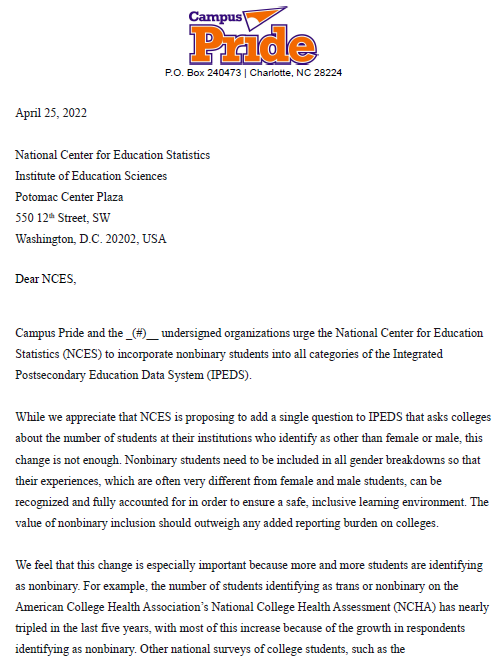
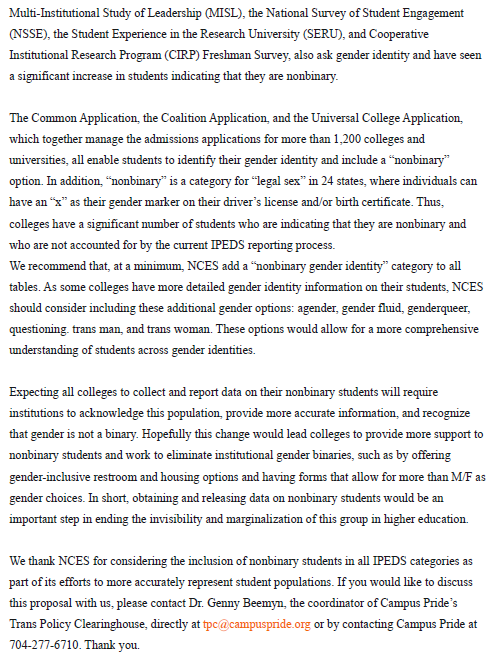
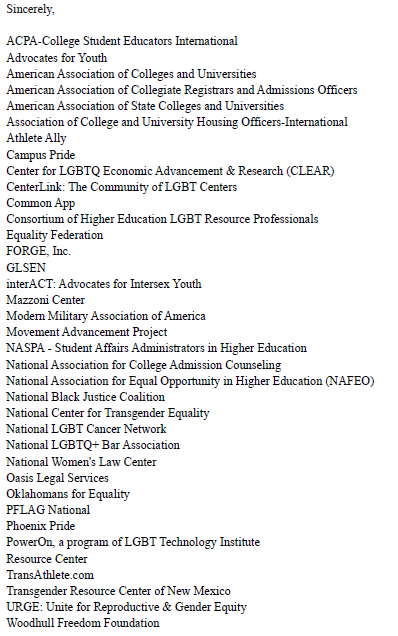
Document: ED-2022-SCC-0026-0053
Received: April 25, 2022
Posted: April 26, 2022
Submitter Information
Name: Mark D'Amico
General Comment
Please see comments in the attached letter.
Attachments
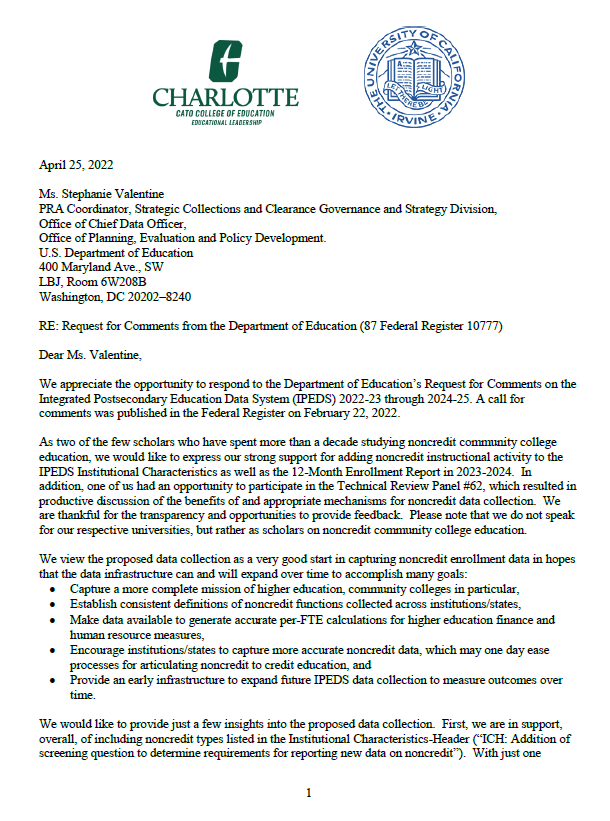
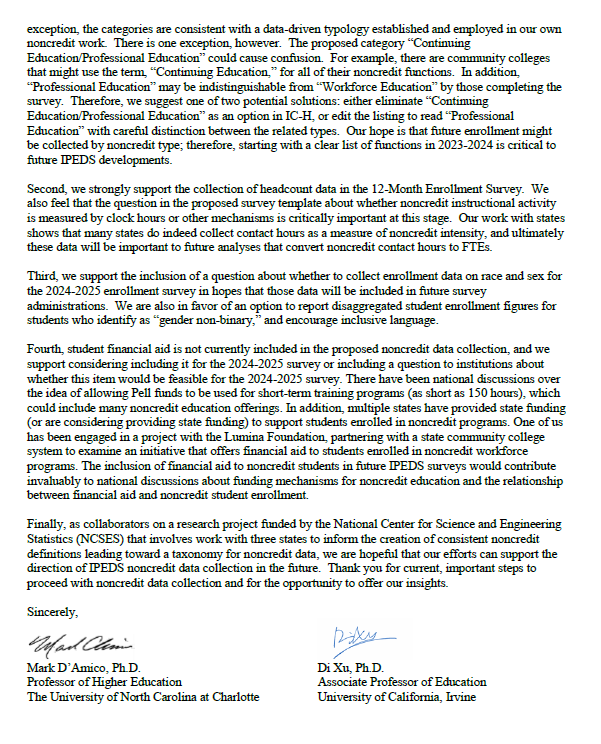
Document: ED-2022-SCC-0026-0054
Received: April 25, 2022
Posted: April 26, 2022
Submitter Information
Organization: College in High School Alliance
General Comment
See attached file(s)
Attachments
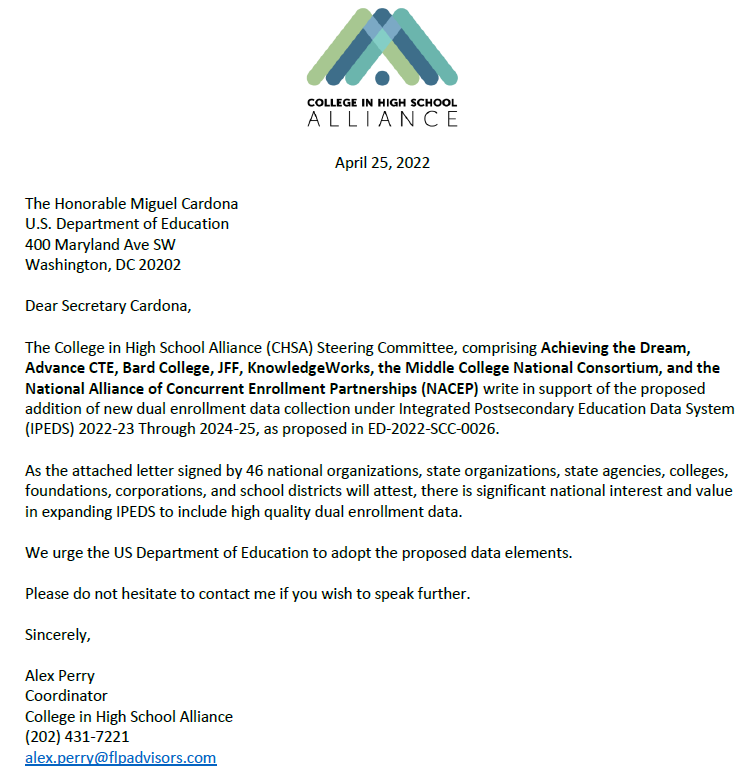
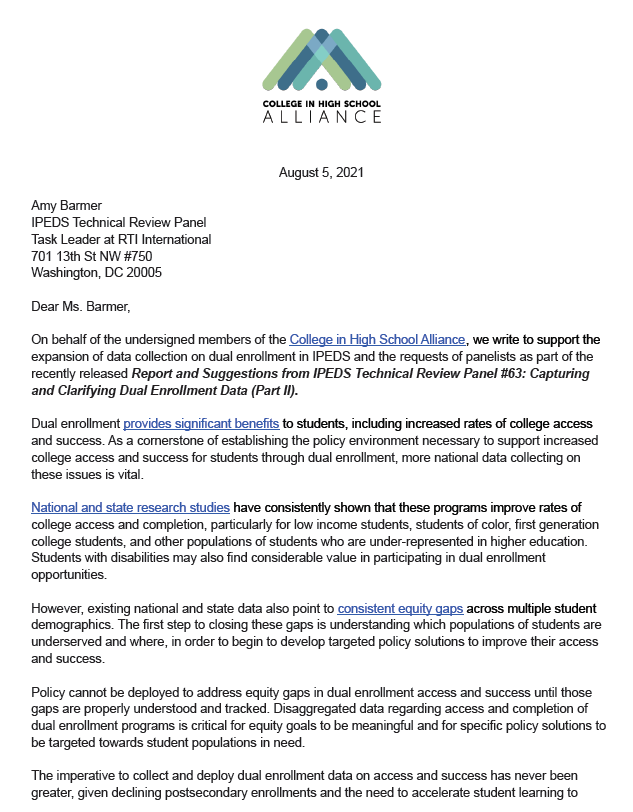
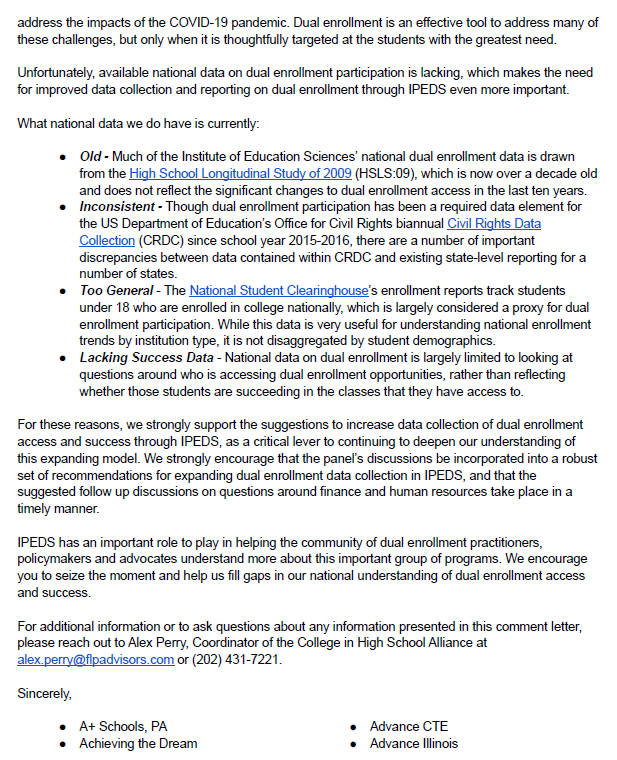
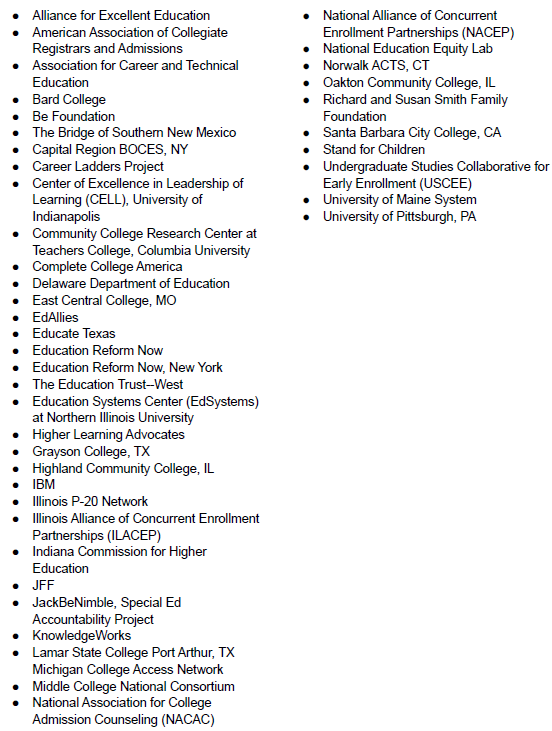
Document: ED-2022-SCC-0026-0055
Received: April 25, 2022
Posted: April 26, 2022
Category: Four-Year Public Institution of Higher Education
Submitter Information
Government Agency Type: State
Government Agency: Stony Brook University
General Comment
Thank you for the opportunity to comment on the Department of Education’s request for comments on proposed changes to the Integrated Postsecondary Education Data System (IPEDS) 2022–23 Through 2024–25. Our comments are provided in the attached pdf.
Sincerely,
Braden J. Hosch
Associate Vice President for Institutional Research, Planning & Effectiveness
Stony Brook University
Attachments
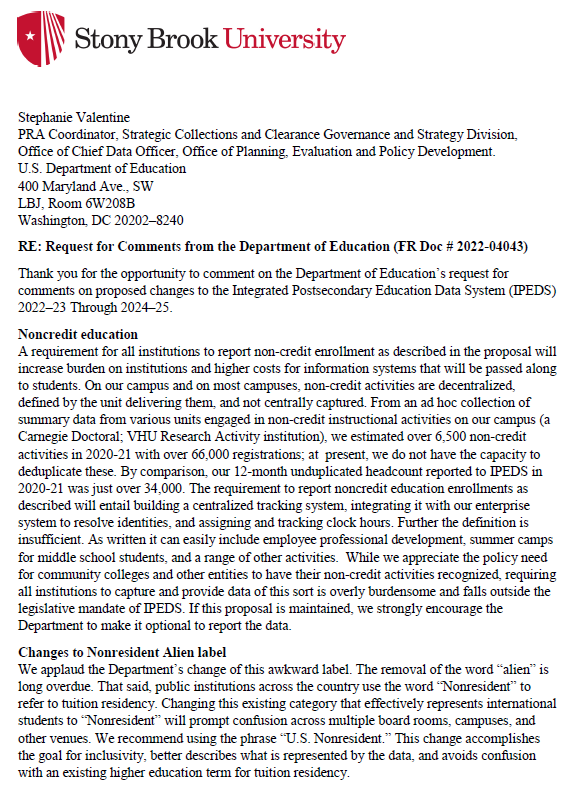
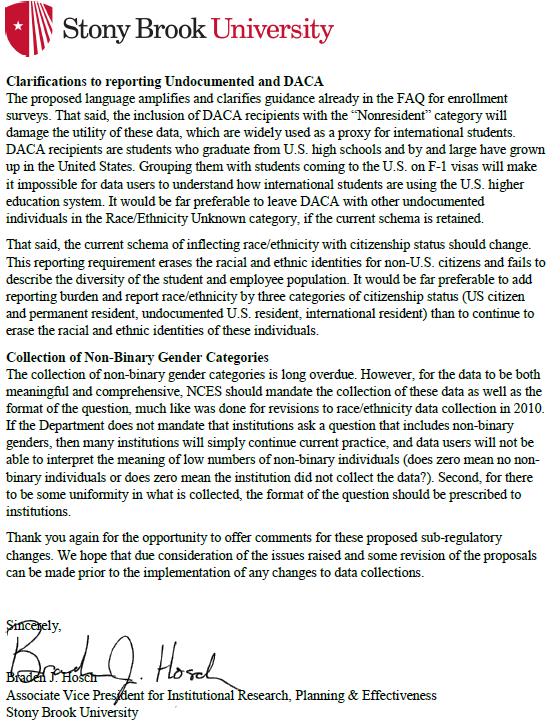
Document: ED-2022-SCC-0026-0056
Received: April 26, 2022
Posted: April 27, 2022
Category: Federal Agency
Submitter Information
Name: Phillip Connor
General Comment
While we are in favor, and indeed recommend, the removal of the term “alien” from the label used for “non-resident alien”, we disagree with the proposed guidance on student groups considered part of the non-resident and resident categories.
The attached analysis indicates that higher education institutions do need guidance on how to better report undocumented students using IPEDS. Comparisons to augmented 2019 American Community Survey (ACS) data suggests that the reporting of undocumented students through IPEDS is not consistently applied by all schools.
However, in order to limit disruptions in annual trends for race and ethnicity, the Department of Education should consider an alternative approach to defining residents (the group for which race and ethnicity is reported) as those who have completed high school or a high school equivalency within the U.S. and were not on an F-1 visa at time of high school graduation. This would permit the inclusion of most undocumented and DACA students studying in higher education institutions to be considered residents, a considerably large population and one that has spent most of their educational experience within the U.S. The data analysis below demonstrates this is the best path forward in keeping data trends as consistent as possible.
Attachments
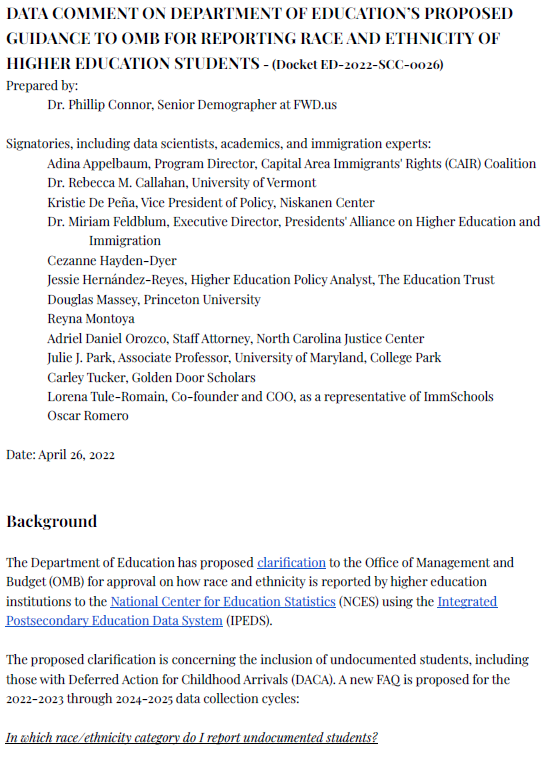
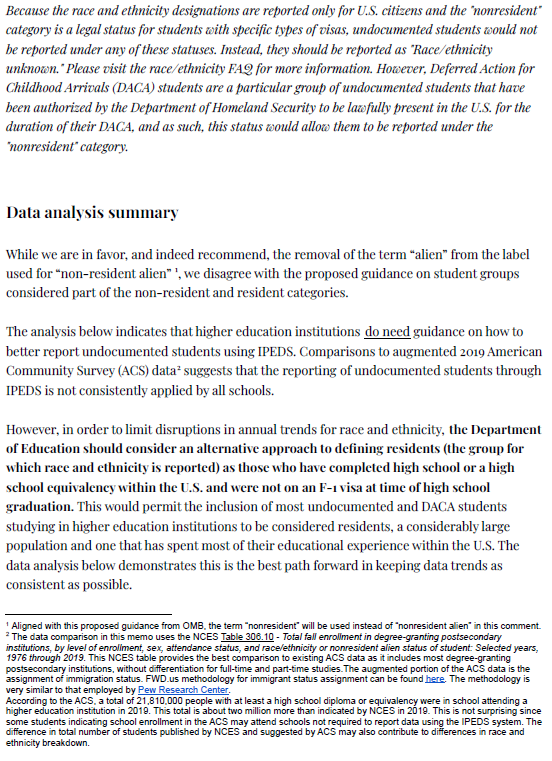
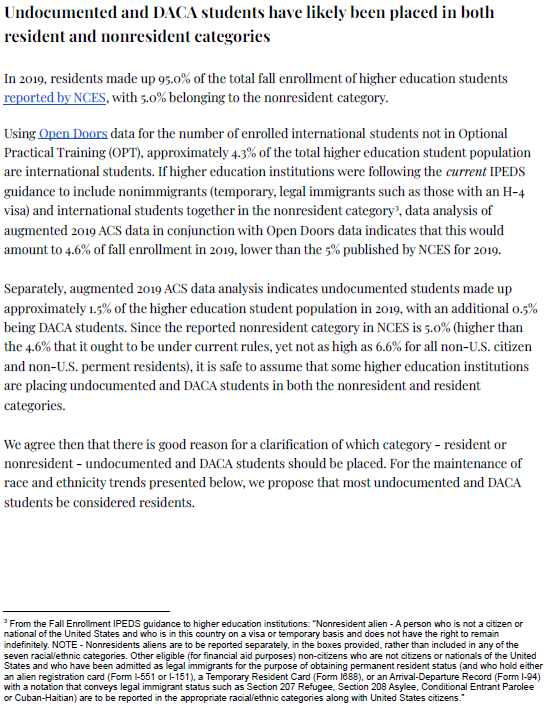
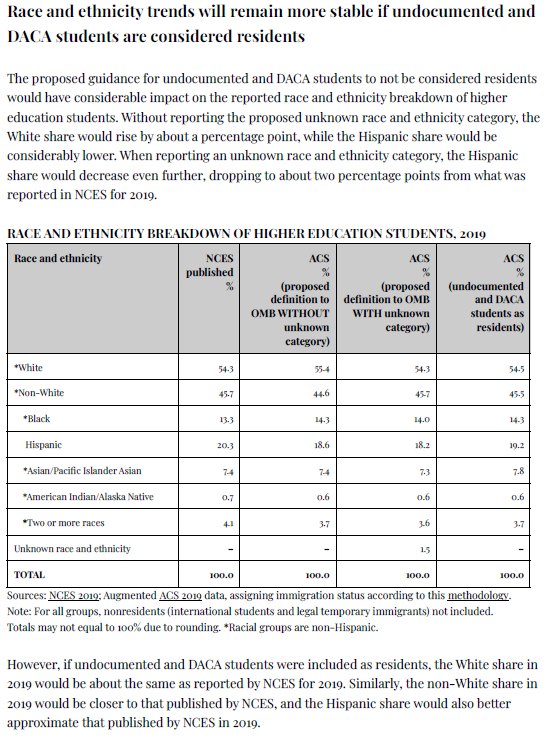
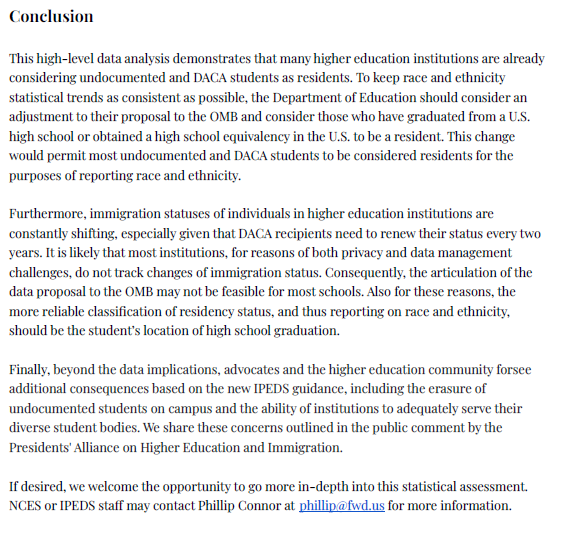
Document: ED-2022-SCC-0026-0057
Received: April 26, 2022
Posted: April 27, 2022
Submitter Information
Name: Michelle Van Noy
General Comment
I have uploaded a letter indicating my support for the addition of measures of noncredit activity.
Attachments
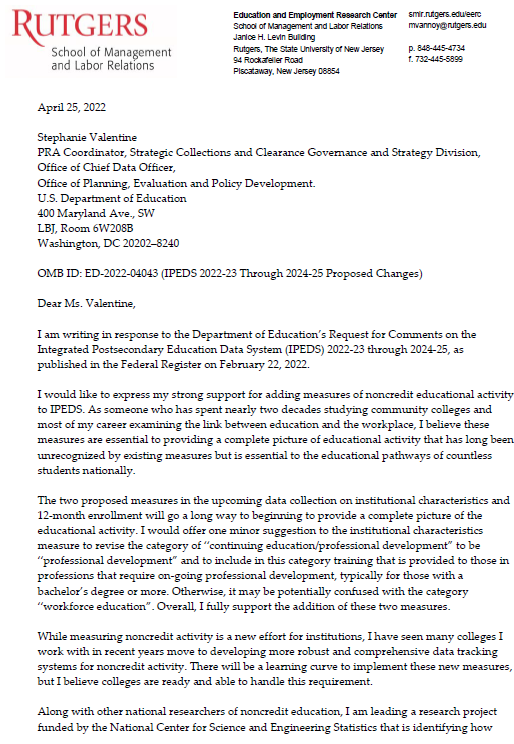
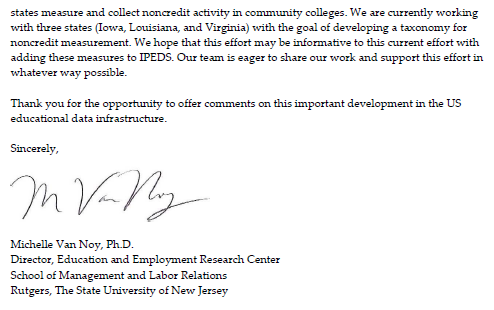
Document: ED-2022-SCC-0026-0058
Received: April 26, 2022
Posted: April 27, 2022
Submitter Information
Name: Phillip Connor
General Comment
While we are in favor, and indeed recommend, the removal of the term “alien” from the label used for “non-resident alien” , we disagree with the proposed guidance on student groups considered part of the non-resident and resident categories.
The attached analysis indicates that higher education institutions do need guidance on how to better report undocumented students using IPEDS. Comparisons to augmented 2019 American Community Survey (ACS) data suggests that the reporting of undocumented students through IPEDS is not consistently applied by all schools.
However, in order to limit disruptions in annual trends for race and ethnicity, the Department of Education should consider an alternative approach to defining residents (the group for which race and ethnicity is reported) as those who have completed high school or a high school equivalency within the U.S. and were not on an F-1 visa at time of high school graduation. This would permit the inclusion of most undocumented and DACA students studying in higher education institutions to be considered residents, a considerably large population and one that has spent most of their educational experience within the U.S. The data attached analysis demonstrates this is the best path forward in keeping data trends as consistent as possible.
Attachments
IPEDS Data Comment 04262022
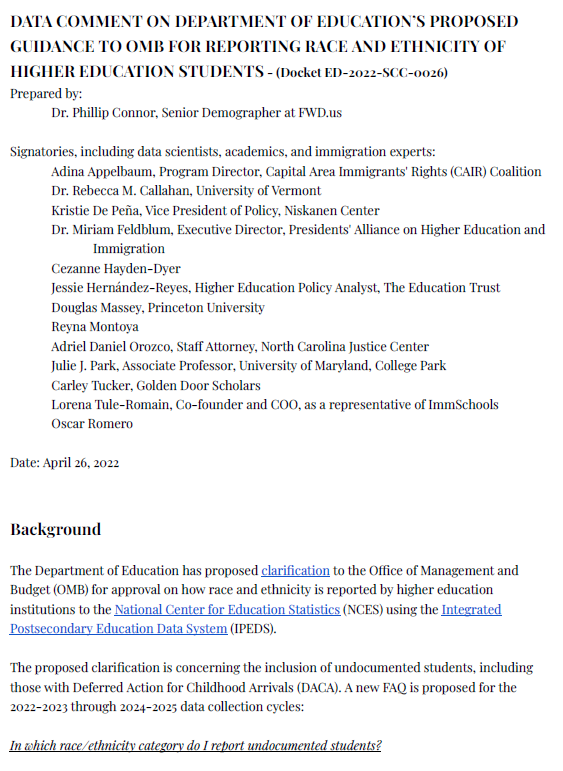
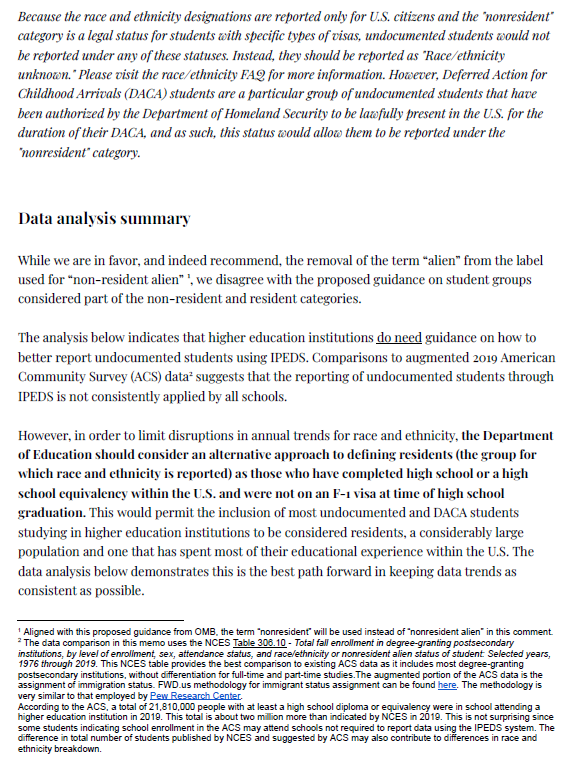
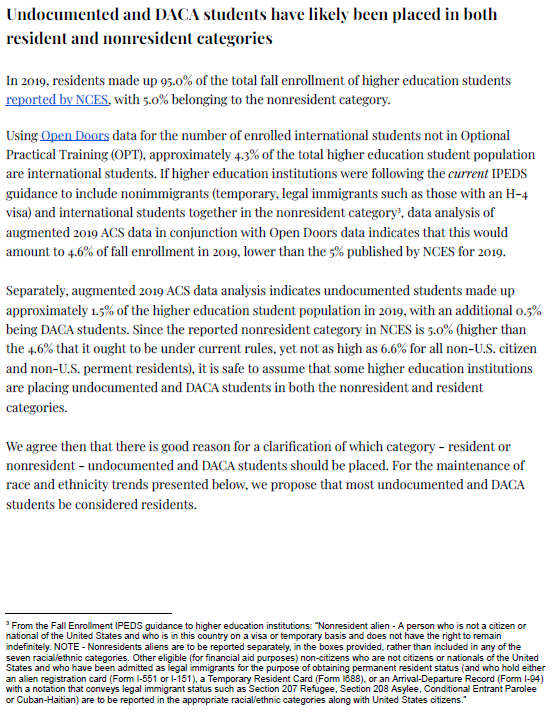
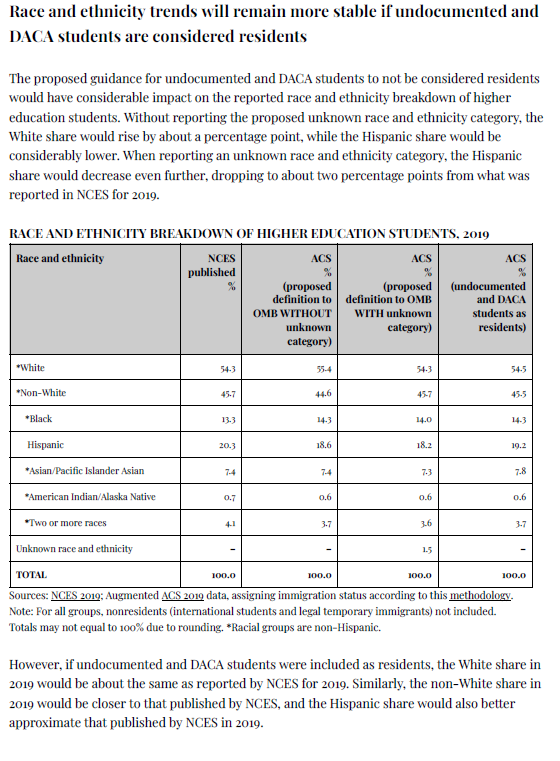
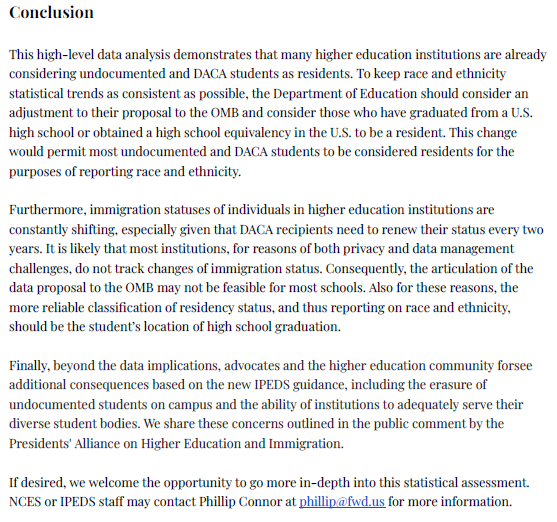
Document: ED-2022-SCC-0026-0059
Received: April 26, 2022
Posted: April 27, 2022
Submitter Information
Organization: Institute for Higher Education Policy
General Comment
See Attached
Attachments
IPEDS Support Letter for Submission
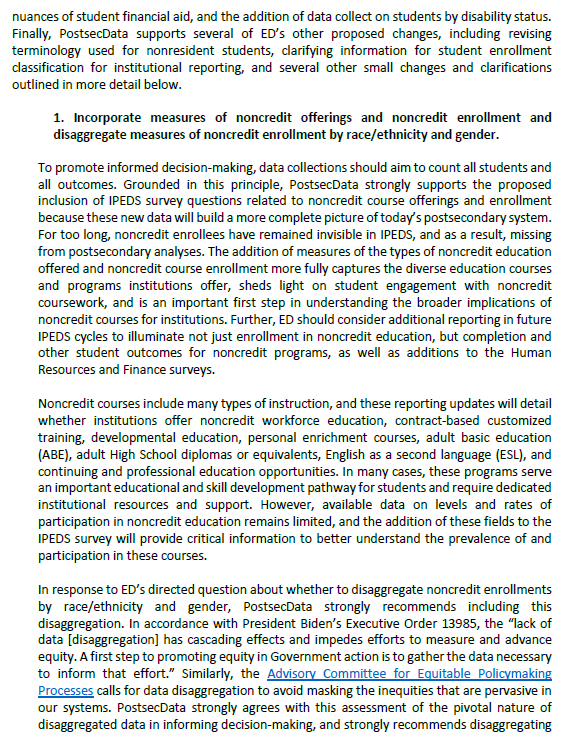
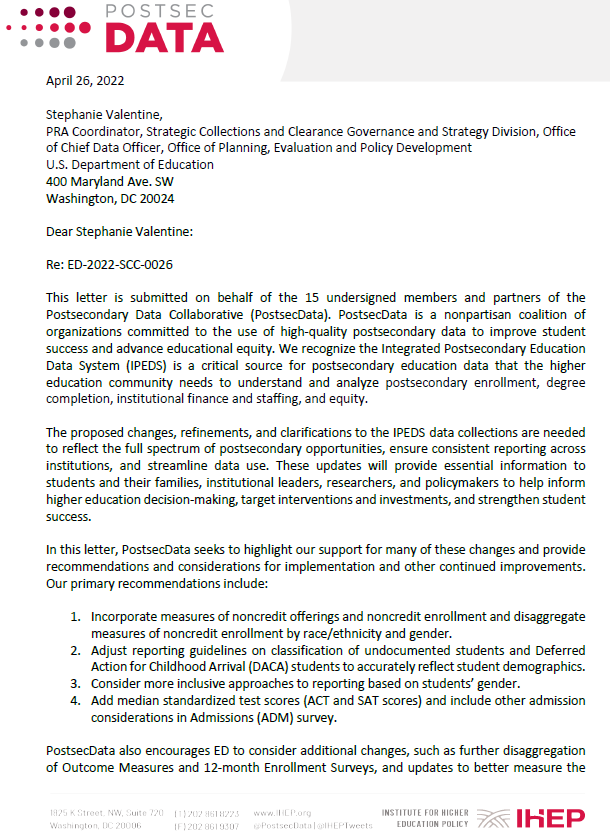

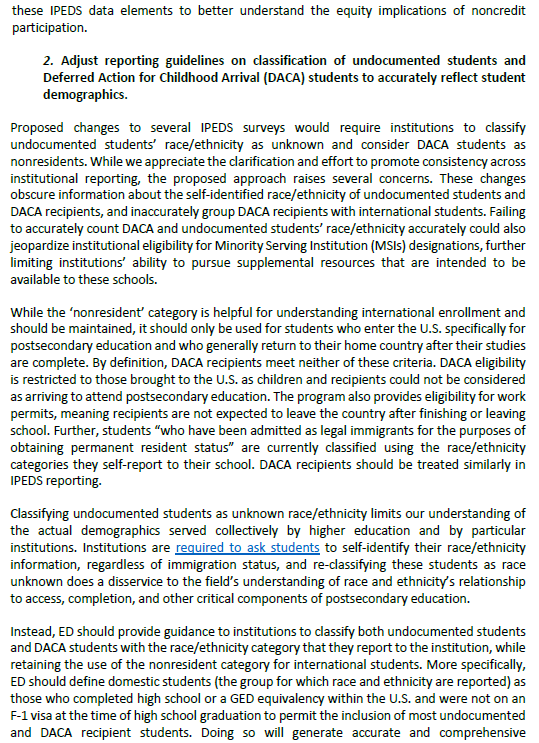
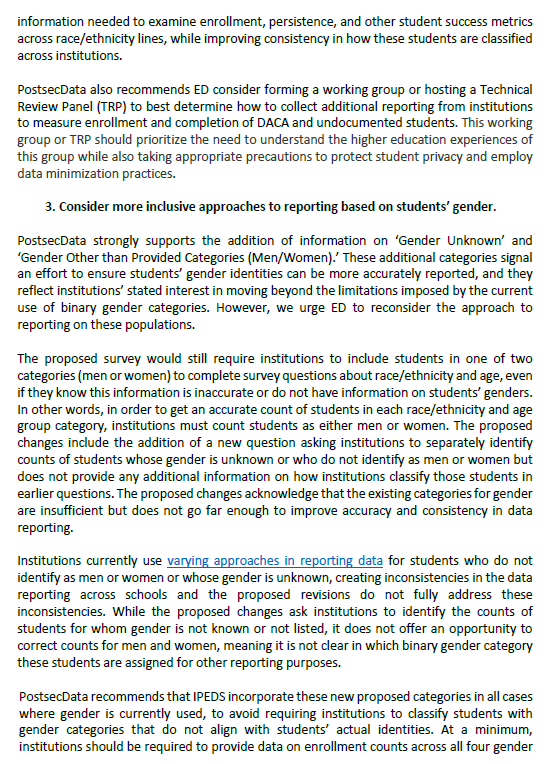
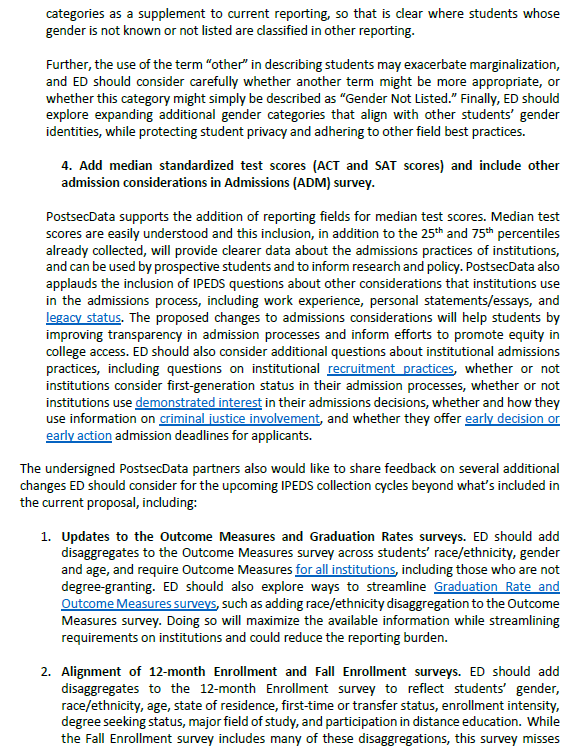
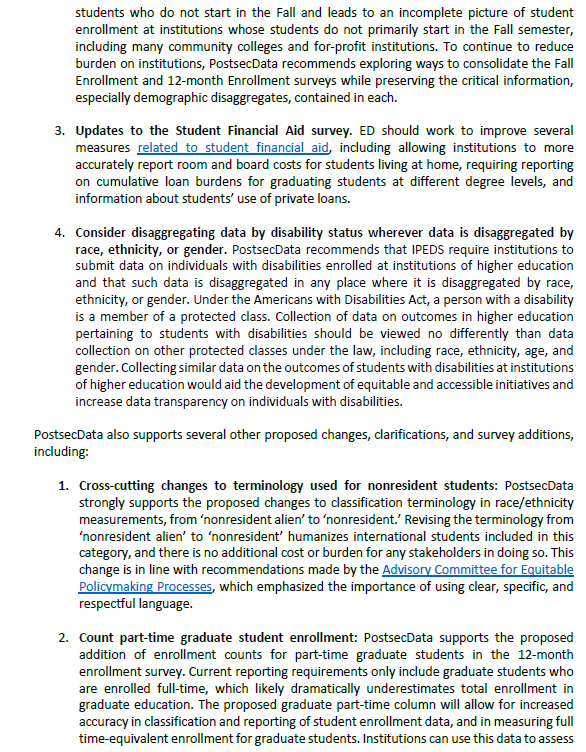
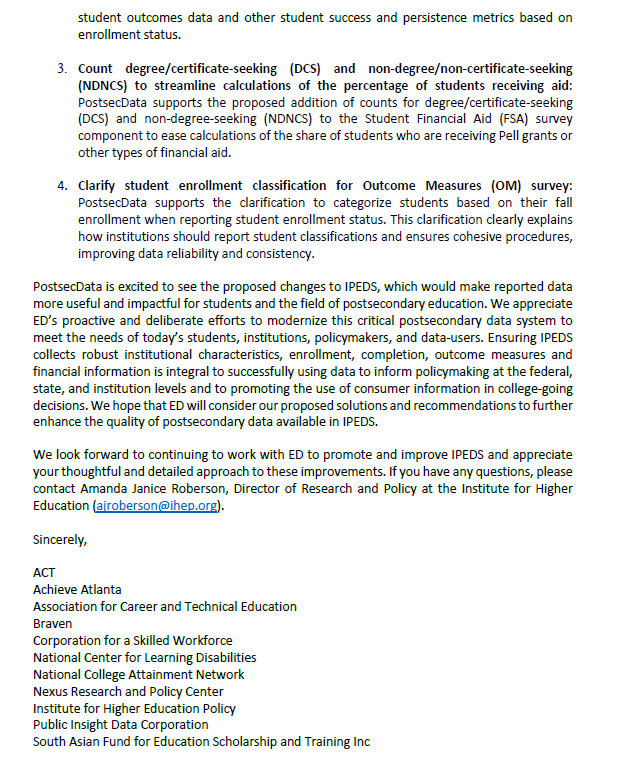

Document: ED-2022-SCC-0026-0060
Received: April 26, 2022
Posted: April 27, 2022
Submitter Information
Organization: Presidents' Alliance on Higher Education and Immigration
General Comment
Please see attached comment signed by 29 organizations
Attachments
2022-04-19 NPRM Comment re IPEDS_Final.docx
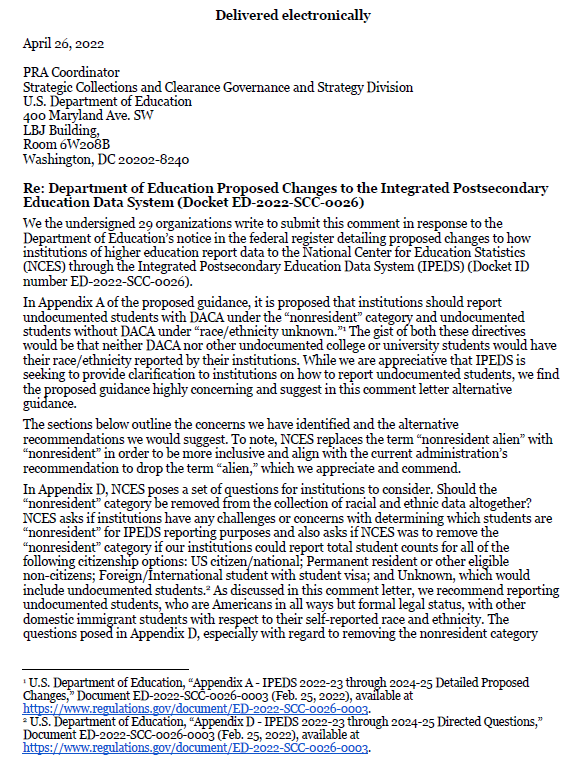
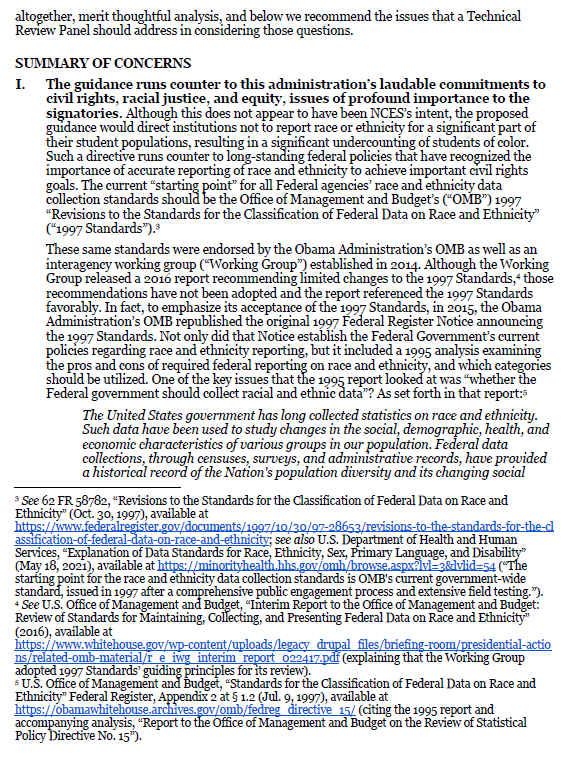
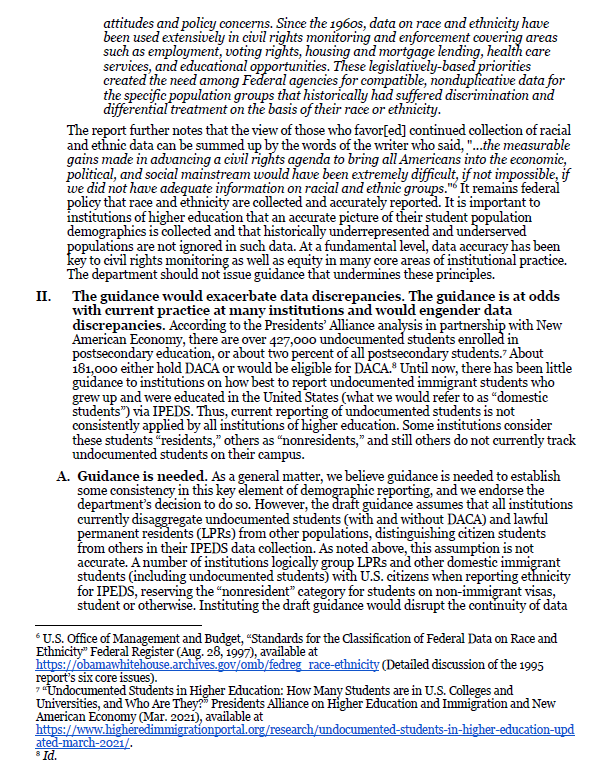
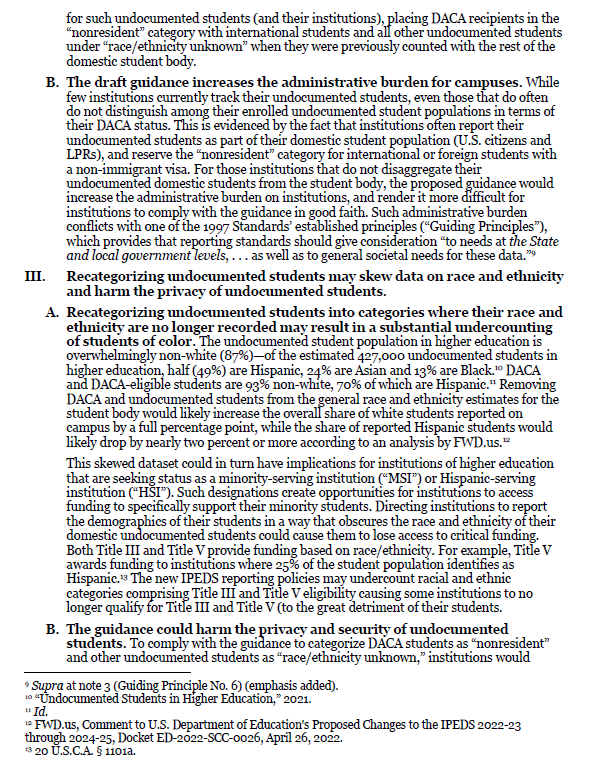
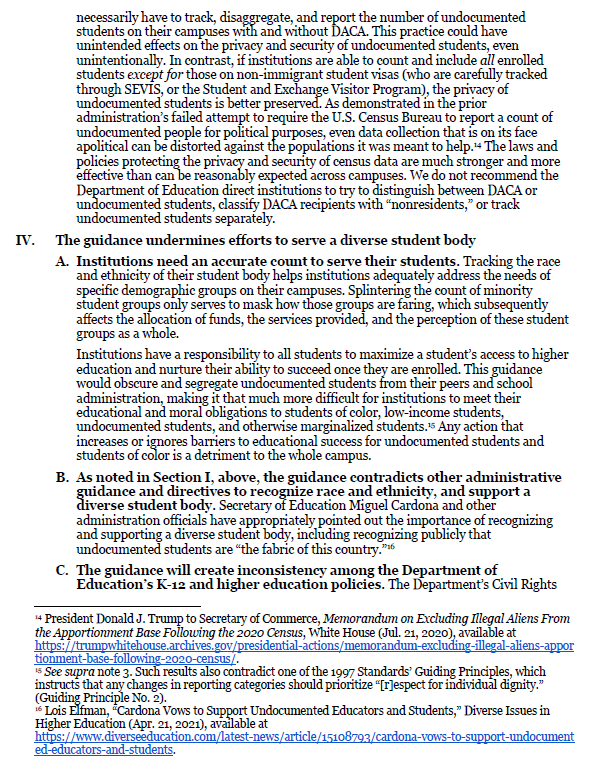
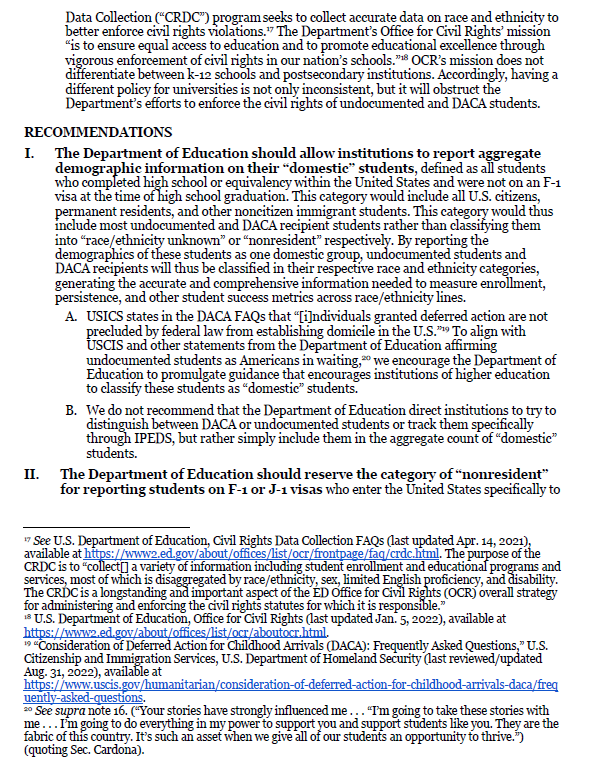
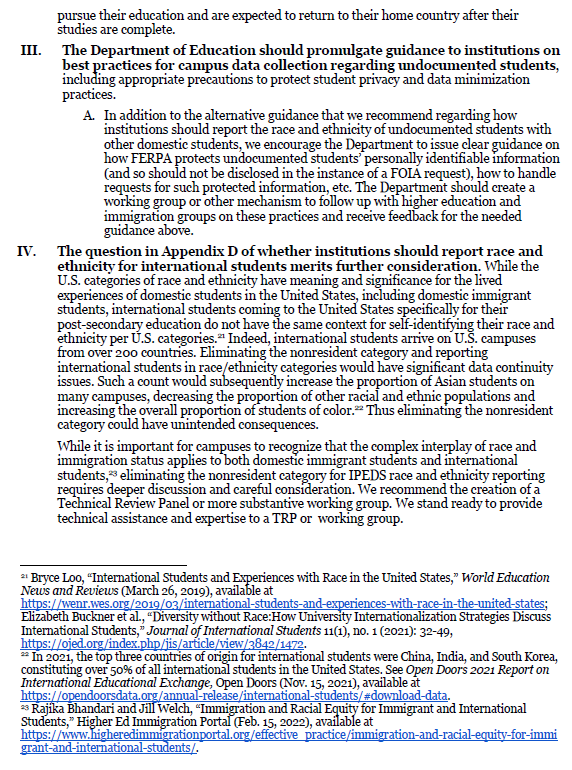
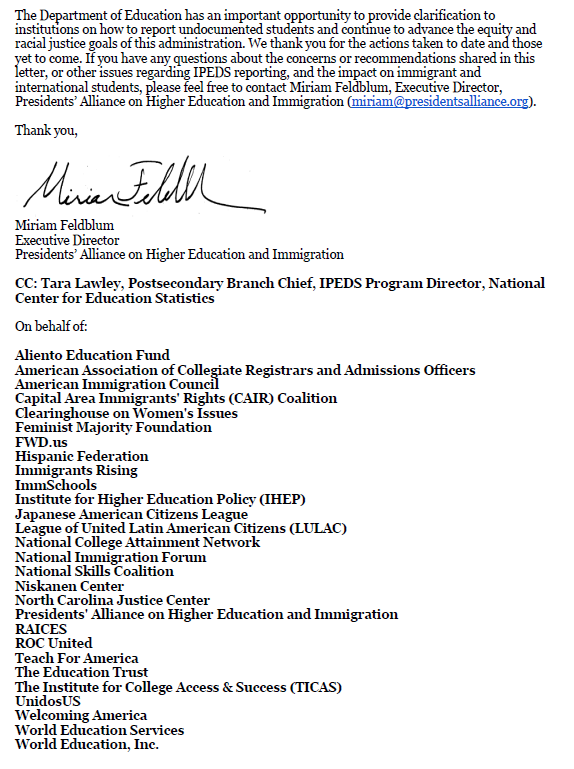
Document: ED-2022-SCC-0026-0061
Received: April 26, 2022
Posted: April 27, 2022
Submitter Information
Organization: California State University
General Comment
Thank you for the opportunity to comment on the Integrated Postsecondary Education Data System (IPEDS) collection for 2022–23 through 2024–25. Comments from California State University are provided in the attached pdf.
Attachments
IPEDS Comment_CaliforniaStateUniversity
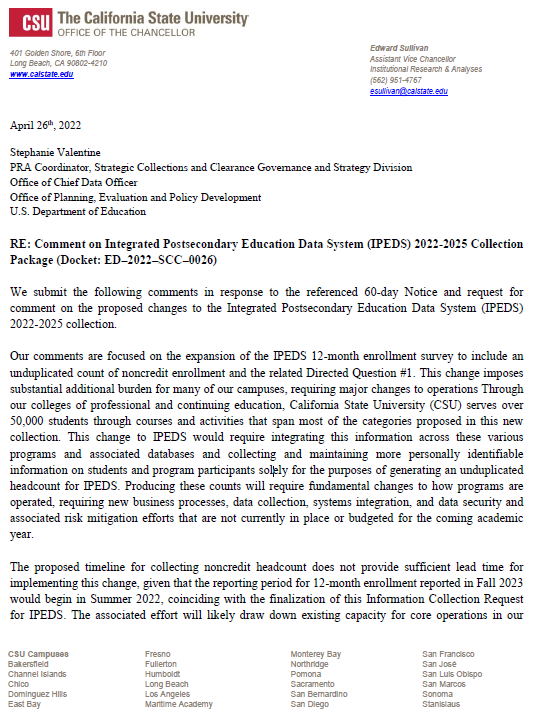
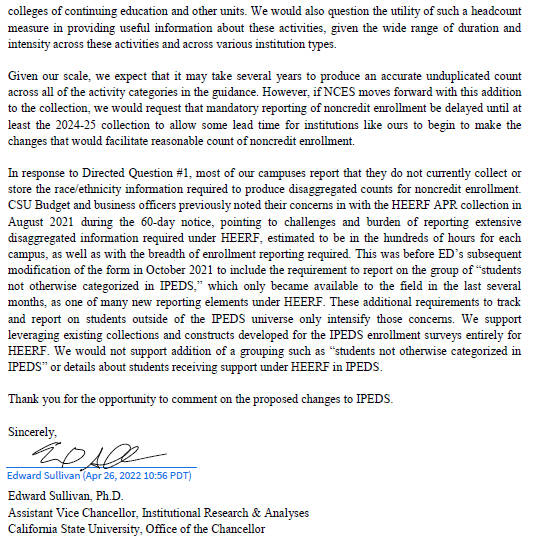
Document: ED-2022-SCC-0026-0062
Received: April 26, 2022
Posted: April 27, 2022
Submitter Information
Organization: American Association of Community Colleges
General Comment
See attached file(s)
Attachments
AACC_Comments_for_ED-2022-SCC-0026-0001
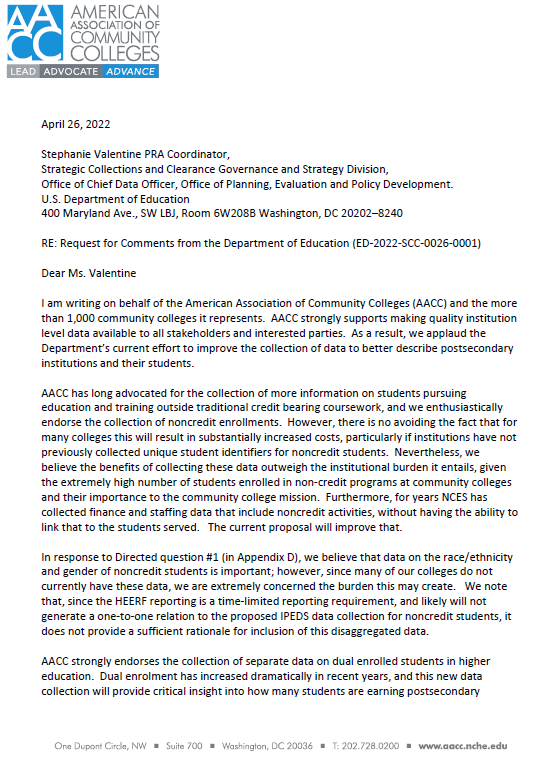
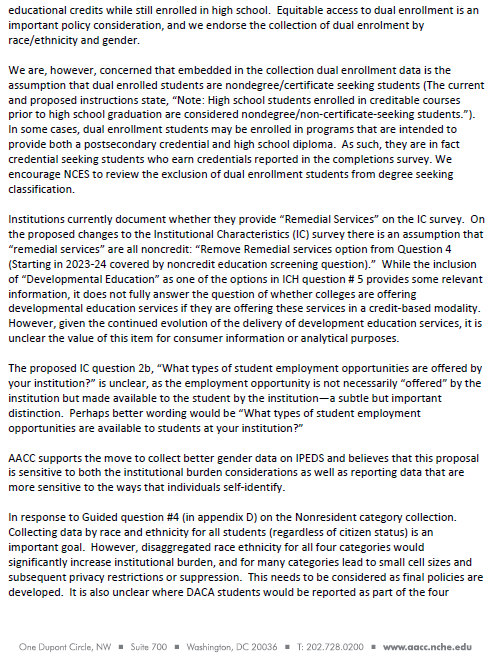
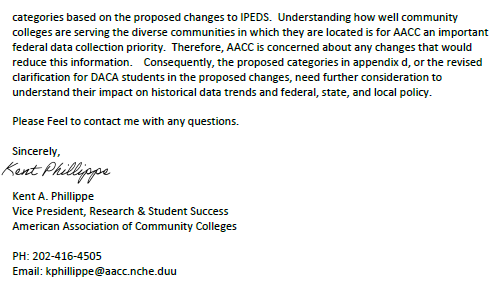
Document: ED-2022-SCC-0026-0063
Received: April 26, 2022
Posted: April 27, 2022
Submitter Information
Organization: Office of Institutional Research, Planning, and Assessment, University of Maryland - College Park
General Comment
On behalf of the Office of Institutional Research, Planning, and Assessment at the University of Maryland, I am writing in support of the proposal to add a separate collection of “gender unknown” and “gender other than provided categories (Men/Women).” This proposal takes an important step towards creating both a more inclusive environment for students on campus and more inclusive and accurate reporting about our students.
Our community members have advocated for more inclusive, gender-affirming policies. For example, students helped design and implement Pronouns Pronouncement Day on campus and supported efforts to add more gender-neutral bathrooms on campus. At the petition of our students, the University of Maryland Senate approved formal Policies and Procedures Governing Preferred/Primary Names and Sex/Gender Markers in University Databases in 2017. This policy calls for the inclusion of additional gender and gender identity markers in University records, not just the binary male/female markers currently used in federal reporting.
Policies like this impact students’ well-being. A recent statement of evidence from the Society for Research in Child Development, co-authored by Dr. Jessica Fish, an Assistant Professor at the University of Maryland, shows that gender-affirming policies can improve students’ mental health. This proposed change in IPEDS reporting is one such policy.
Our office is pleased to support this step toward an important revision to IPEDS reporting guidelines.
Sincerely,
Michelle Appel
Director, Assessment and Decision Support
Office of Institutional Research, Planning, and Assessment
University of Maryland
College Park, MD 20742
Document: ED-2022-SCC-0026-0064
Received: April 26, 2022
Posted: April 27, 2022
Submitter Information
Organization: National Association of Independent Colleges and Universities
General Comment
Please note the attached PDF with comment from the National Association of Independent Colleges and Universities (NAICU). We appreciate the opportunity to provide feedback.
Attachments
NAICU IPEDS Comment April 2022
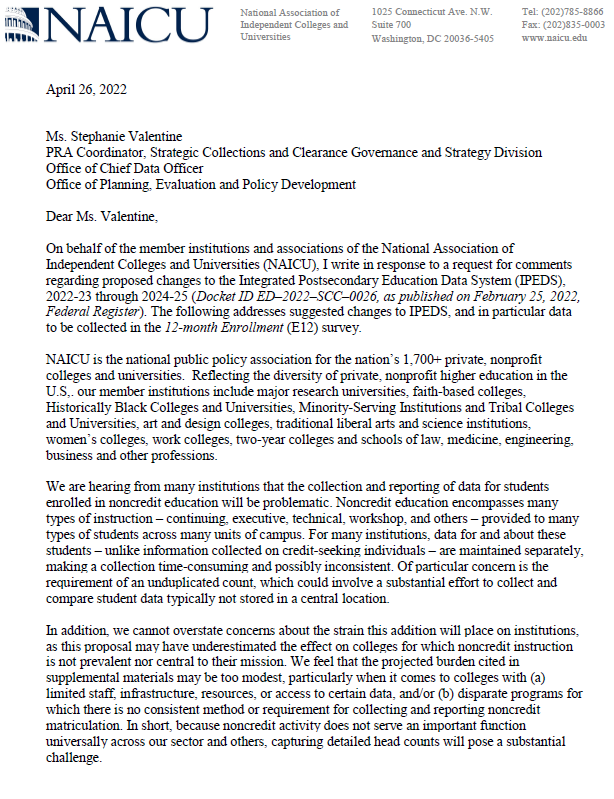
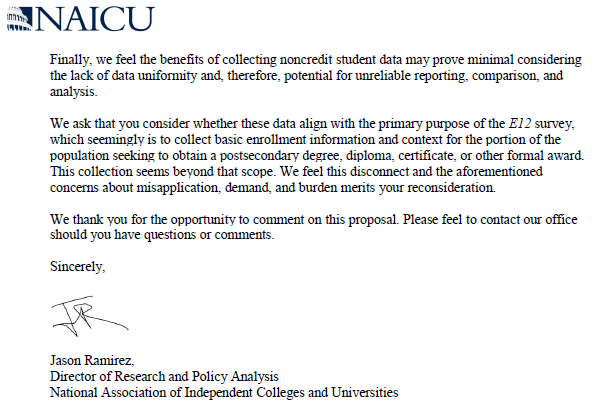
Document: ED-2022-SCC-0026-0065
Received: April 26, 2022
Posted: April 27, 2022
Submitter Information
Organization: National Center for Learning Disabilities
General Comment
See attached PDF
Attachments
IPEDS Comment Letter_NCLD
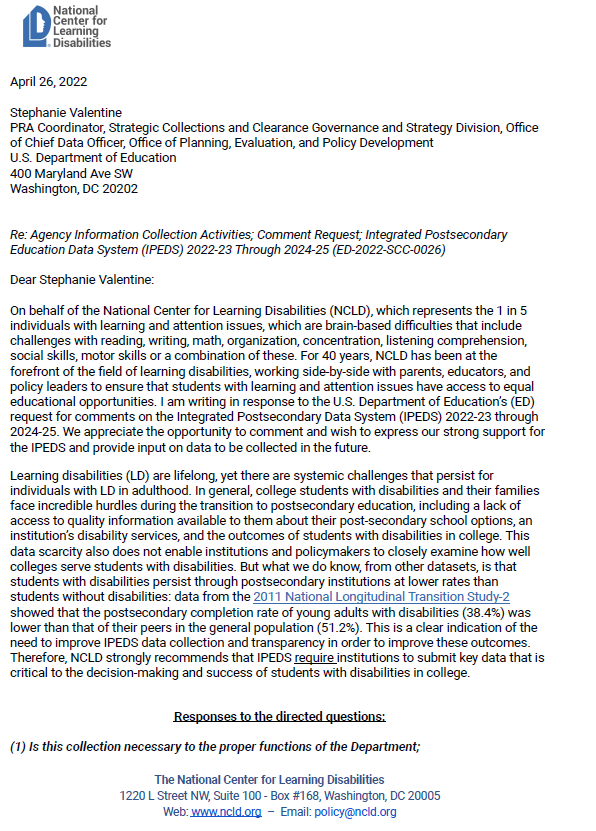
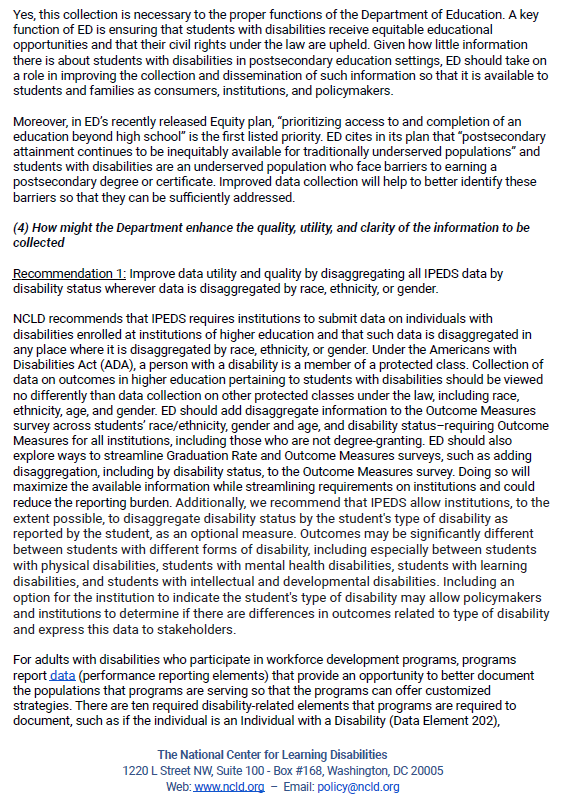
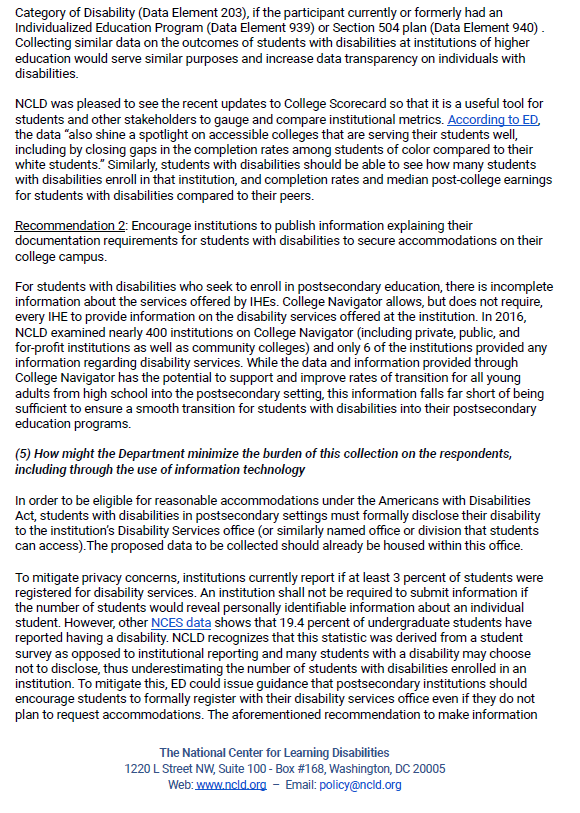
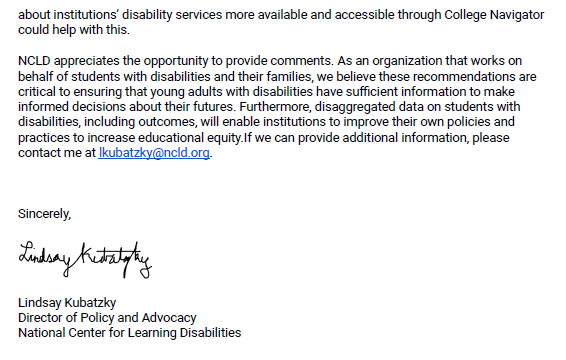
Document: ED-2022-SCC-0026-0066
Received: April 26, 2022
Posted: April 27, 2022
Submitter Information
Government Agency: Coalition of 11 disability rights organizations (see organizations listed on the letter)
General Comment
See attached PDF
Attachments
IPEDS Comment Letter from Disability Organizations
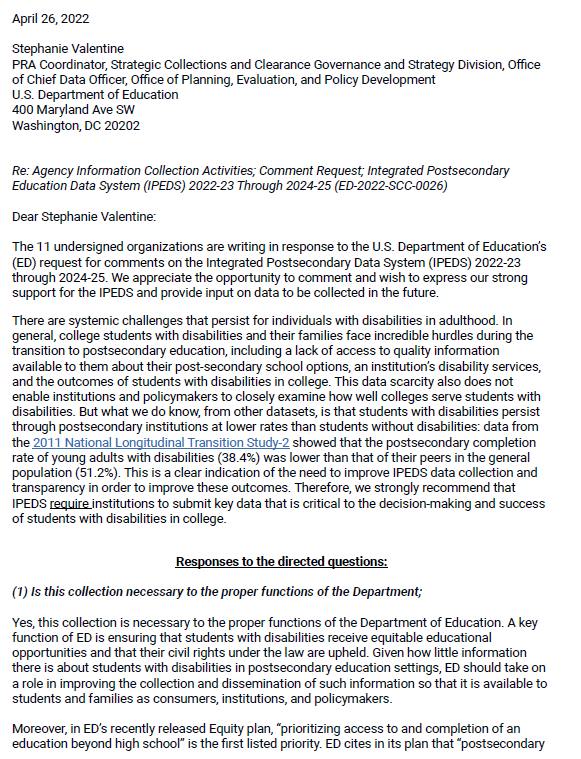
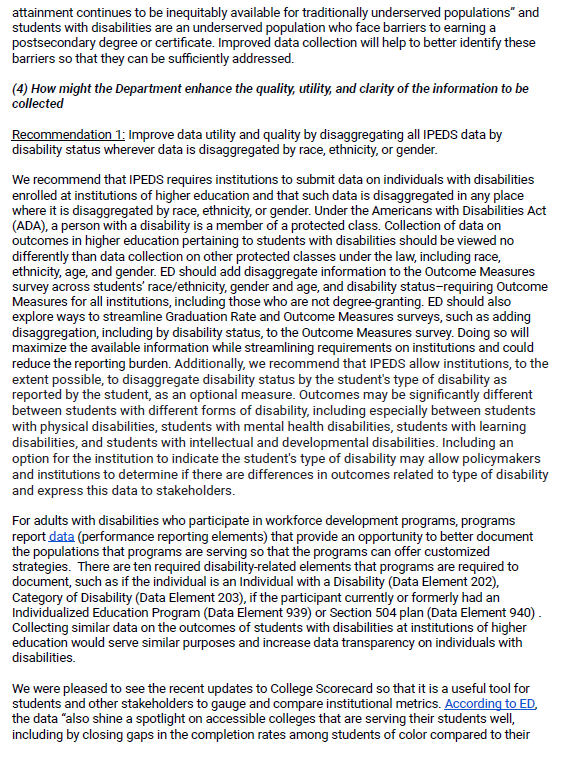
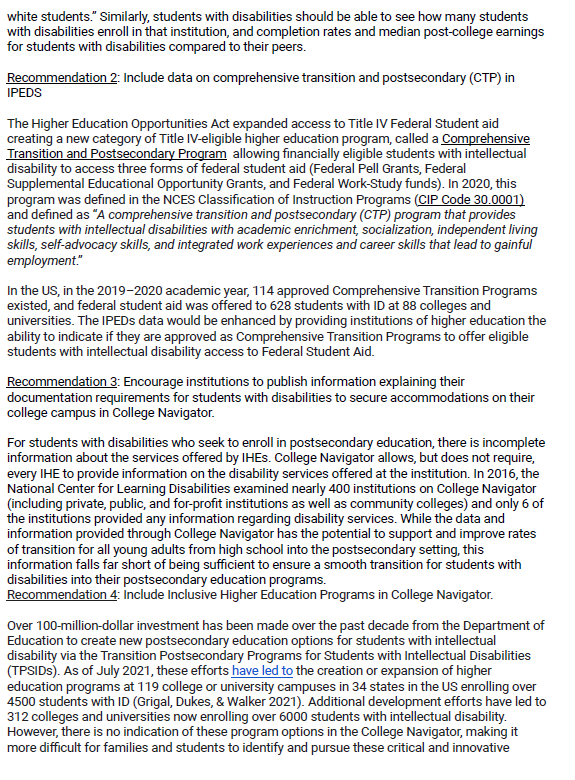
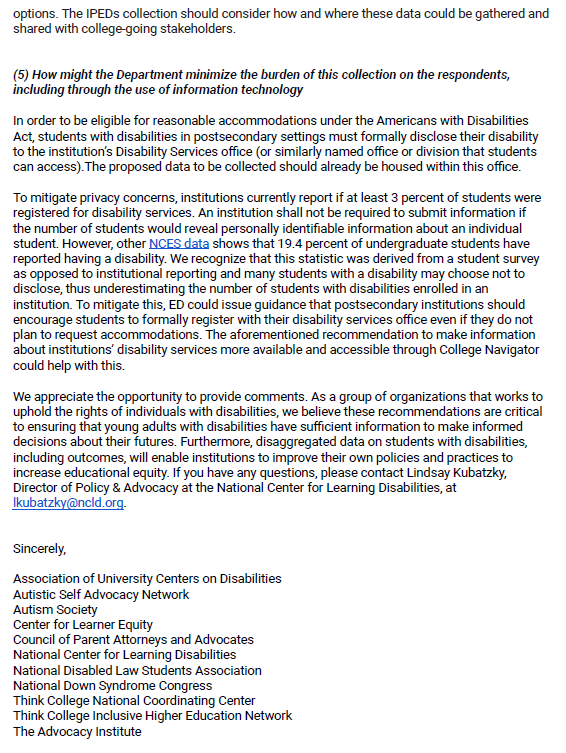
Document: ED-2022-SCC-0026-0067
Received: April 26, 2022
Posted: April 27, 2022
Submitter Information
Organization: Program on Skills, Credentials, and Workforce Policy at George Washington University
General Comment
The Program on Skills, Credentials, and Workforce Policy at George Washington University, which manages the Non-degree Credentials Research Network consisting of approximately 260 researcher and stakeholder members, submits this comment *in support of* the proposed information collection request (ICR) for the Integrated Postsecondary Education Data System (Regulations.gov docket ED-2022-SCC-0026). We believe that the proposed new data fields will be generally valuable for our members’ work and advance research on public policy issues related to non-degree credentials. In particular, we are pleased by the addition of measures of non-credit educational attainment. We also strongly support the addition of data breaking down enrollments by race and ethnicity, and efforts to incorporate non-credit attainment into other IPEDS data collections, including its surveys on completions, human resources, and finances.
We do, however, suggest that IES consider refining the term “continuing education” in the list of types of non-credit educational offerings that institutions can choose from. “Continuing education” could encompass such a wide variety of programs (including for-credit/degree programs) that there may be confusion on the part of institutions responding to the survey. If possible, we would also encourage IES to consider collecting more data on the ages of enrolled students. Given that noncredit education is commonly pursued by older learners, having a sense of which institutions are serving younger noncredit learners and younger learners’ patterns of noncredit enrollment would be tremendously helpful for generating knowledge on the returns to noncredit education for individuals who have yet to enter the workforce or are still very early in their careers. Better data on age would also help us to evaluate the impact of state policies that encourage postsecondary enrollment for older adults, for example by providing free or discounted tuition to residents over a certain age. We do understand the concerns that IES may have about whether this would impose a burden on reporting institutions; however, we believe it would be worthwhile to at least pilot collecting this data to evaluate hard data on the potential burden involved.
Again, we strongly support this ICR; many of our comments above are only intended to help IES think about ways to make IPEDS even more useful to the research community. We would be pleased to consult with IES about future improvements to IEPDS whenever our insights could be helpful.
| File Type | application/vnd.openxmlformats-officedocument.wordprocessingml.document |
| Author | Lawley, Tara |
| File Modified | 0000-00-00 |
| File Created | 2023-09-15 |
© 2026 OMB.report | Privacy Policy